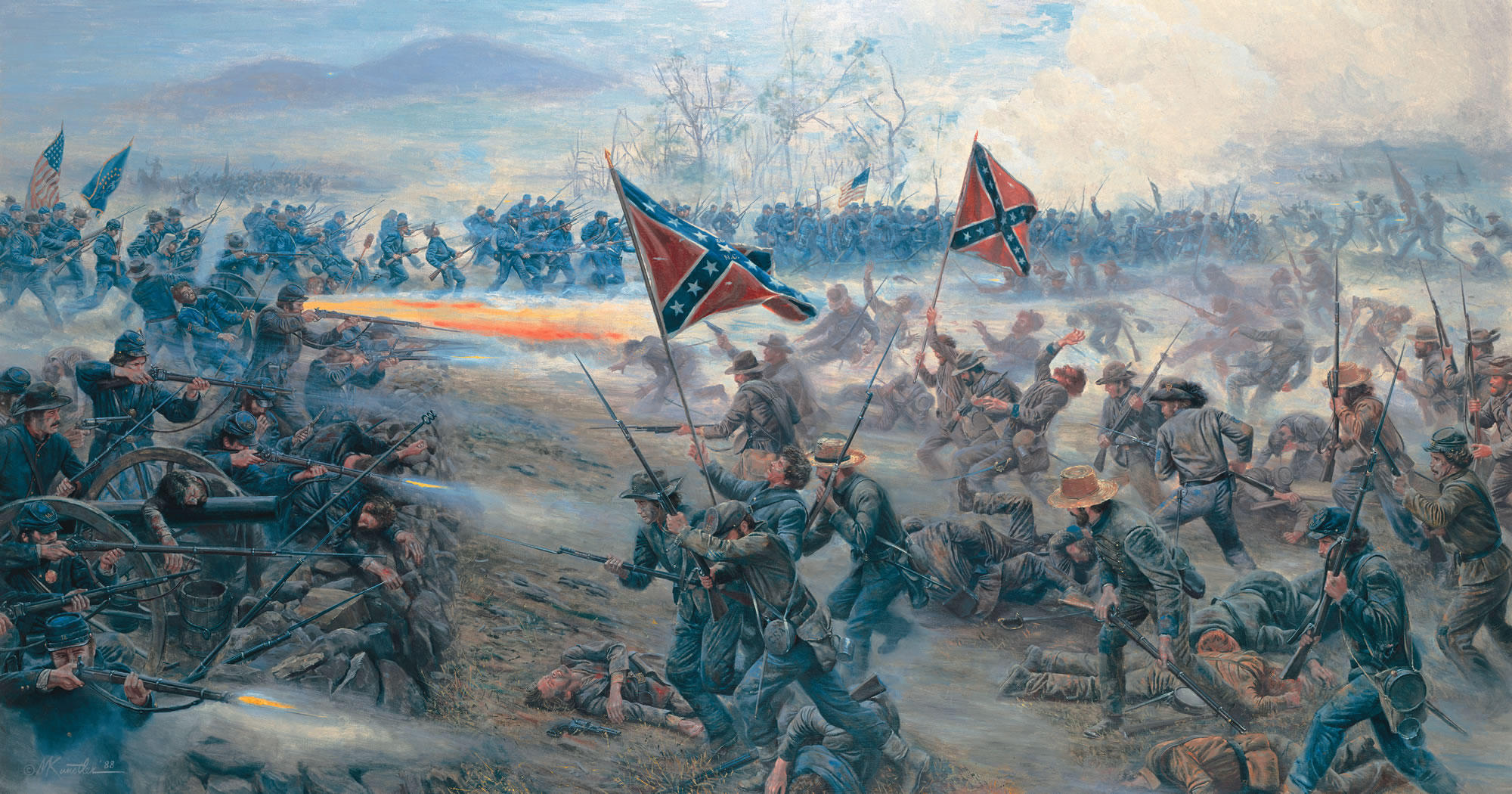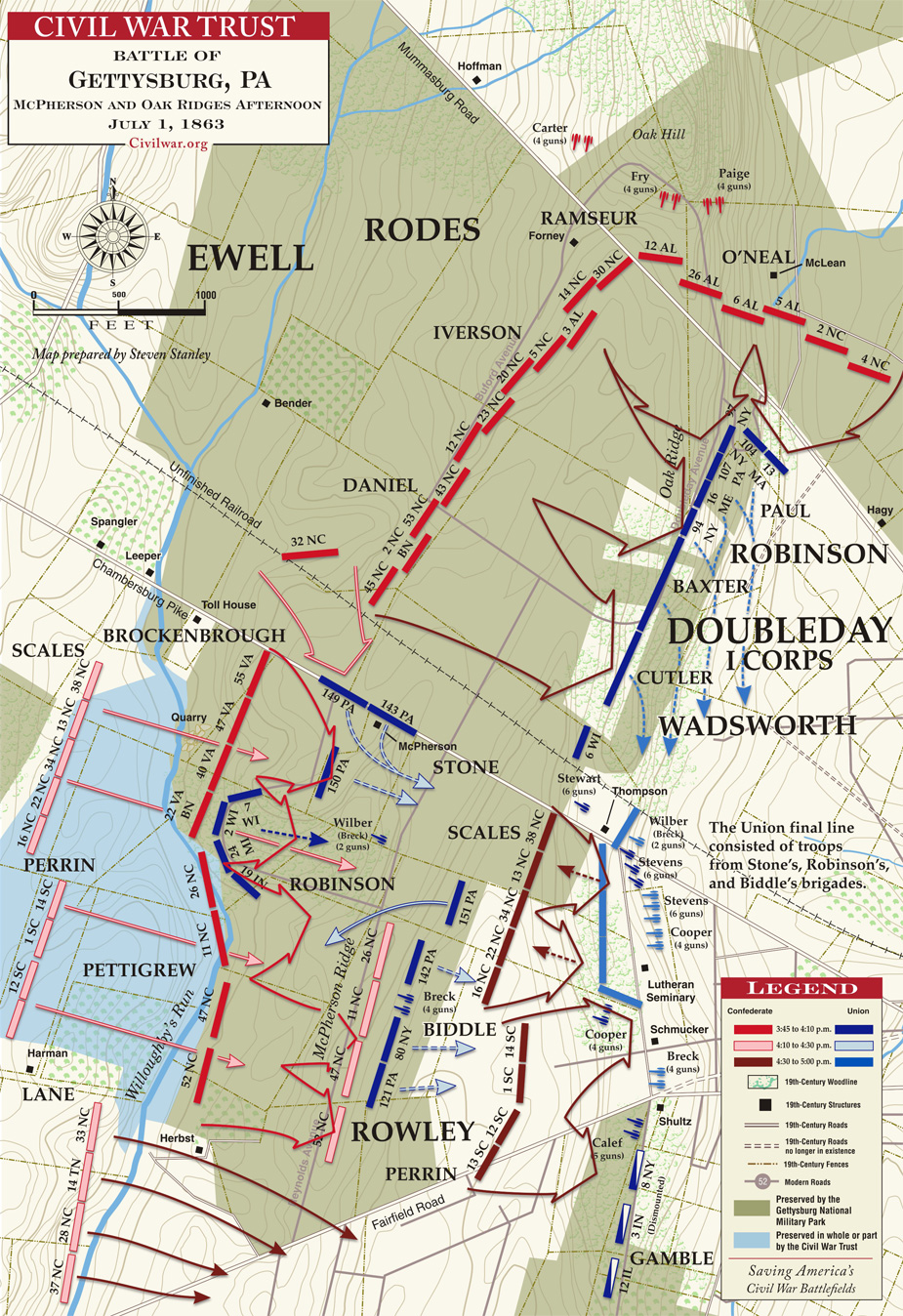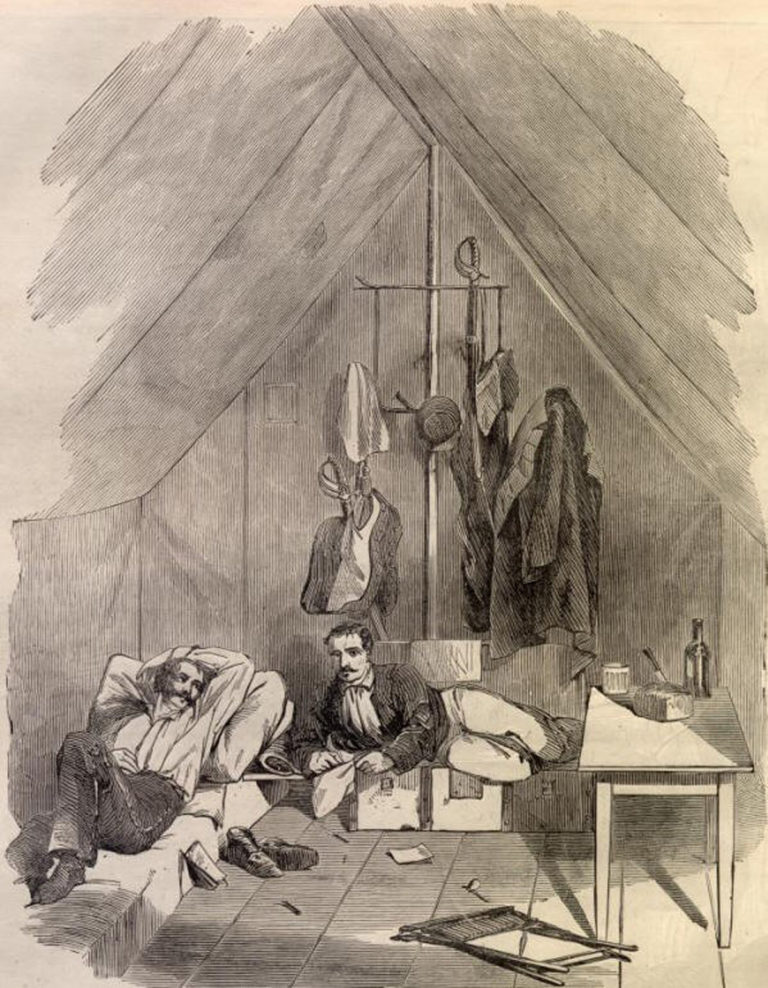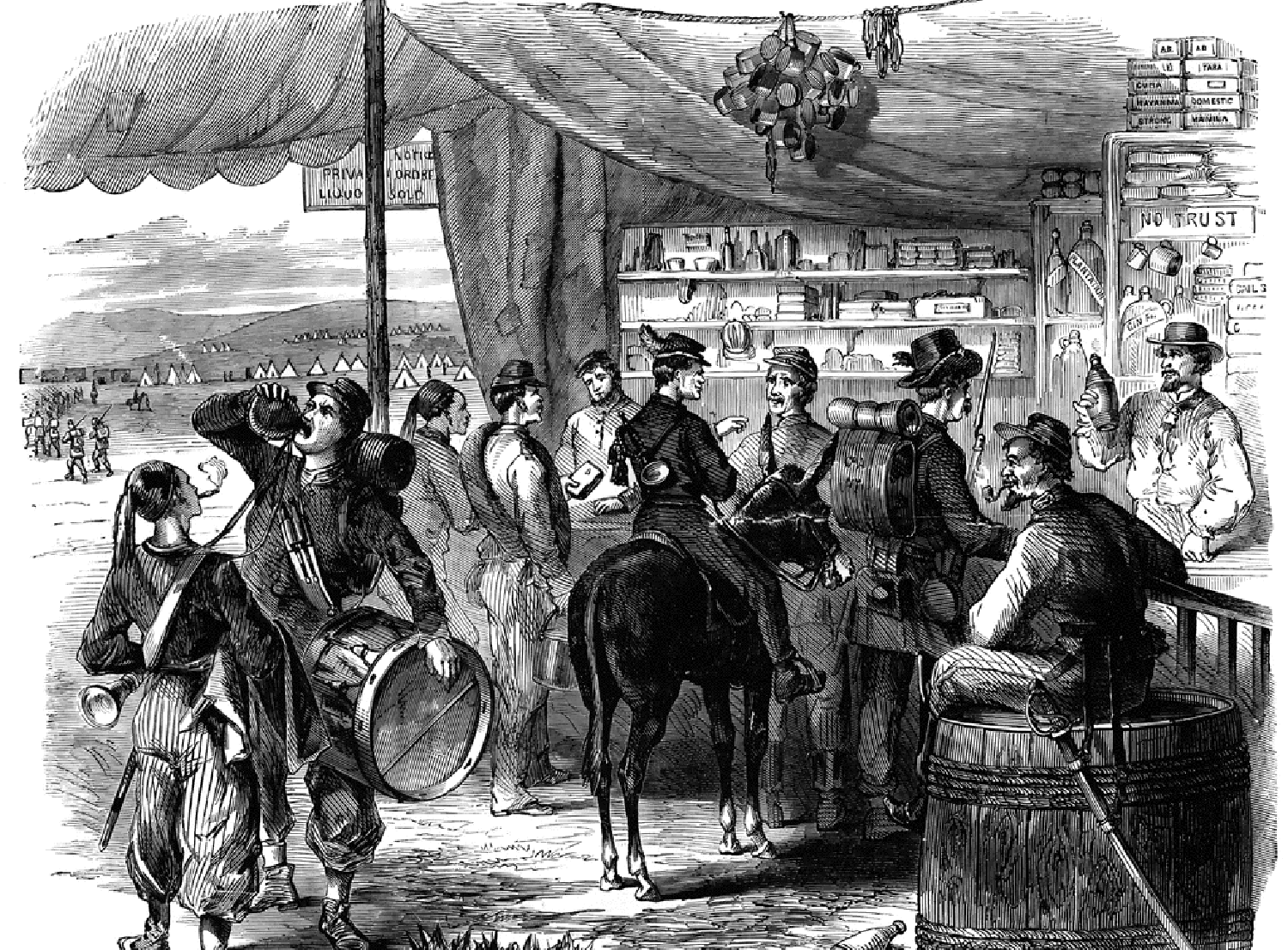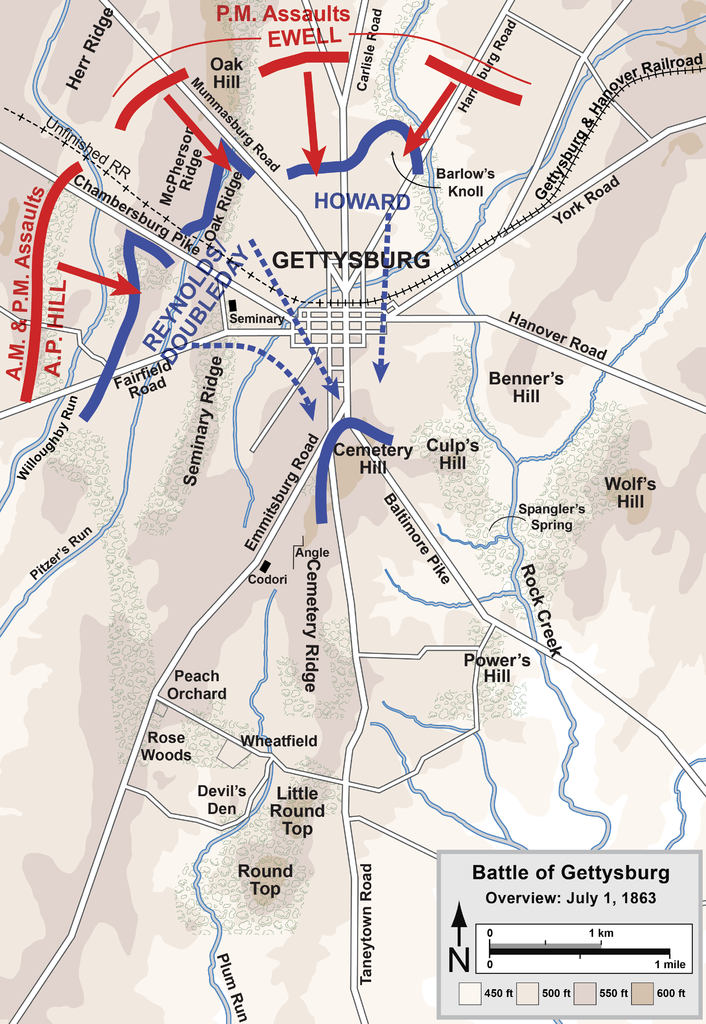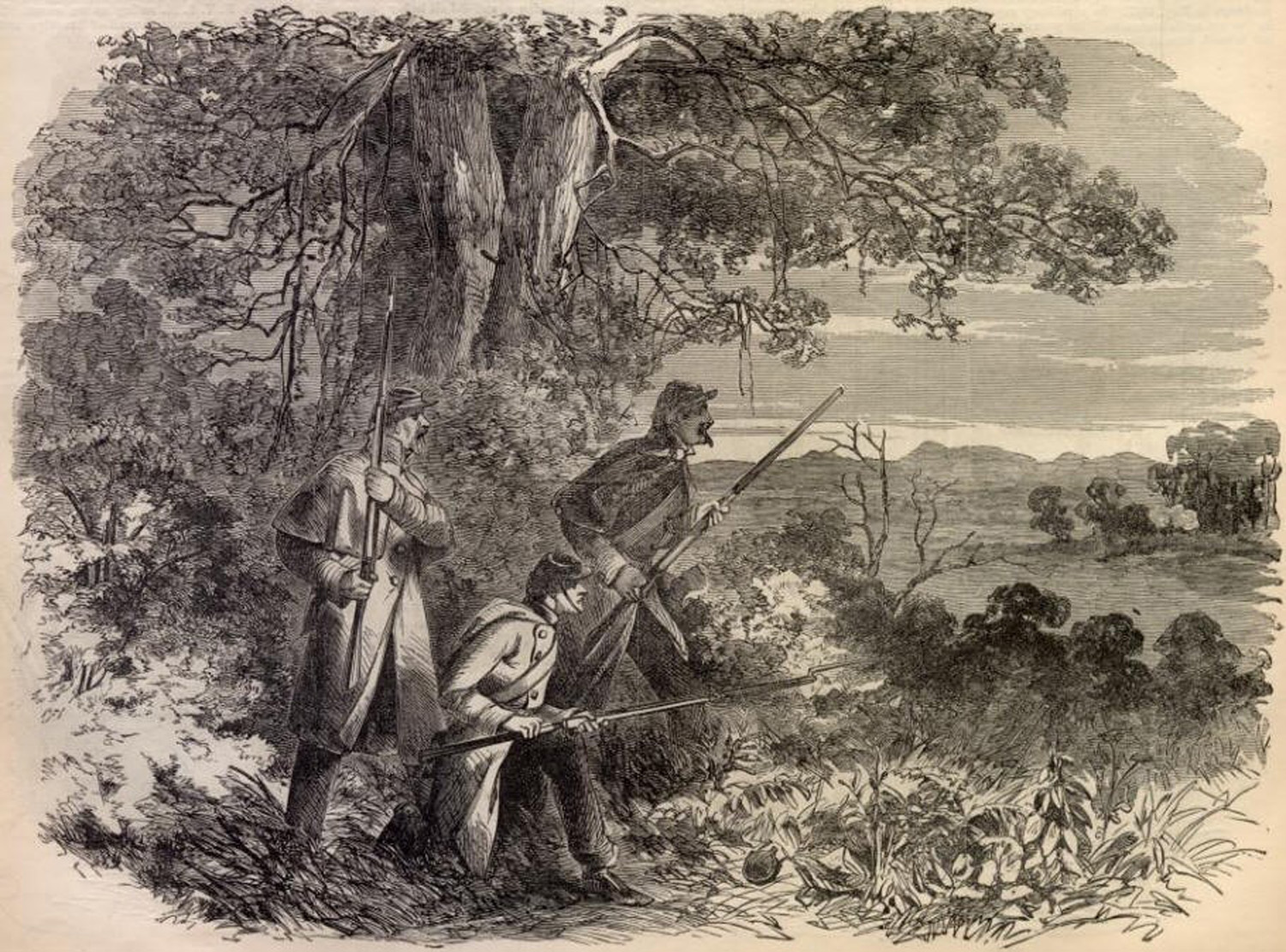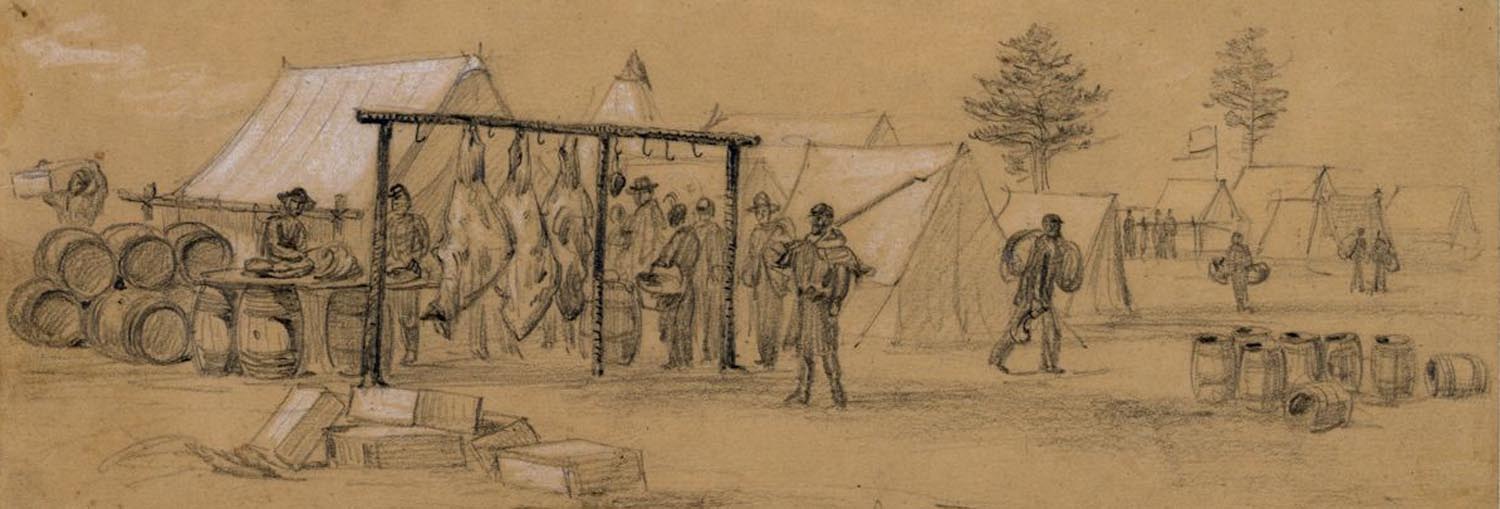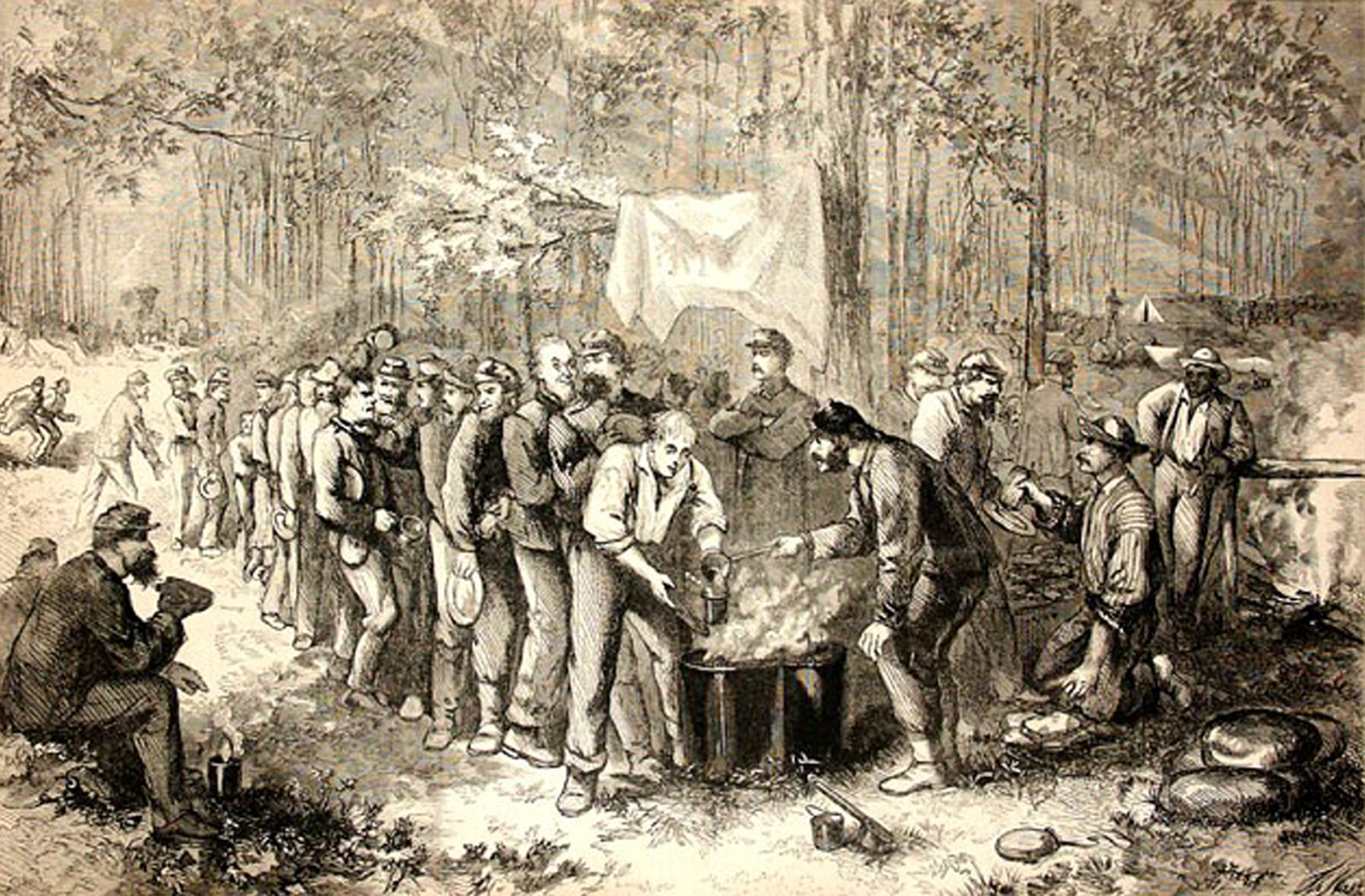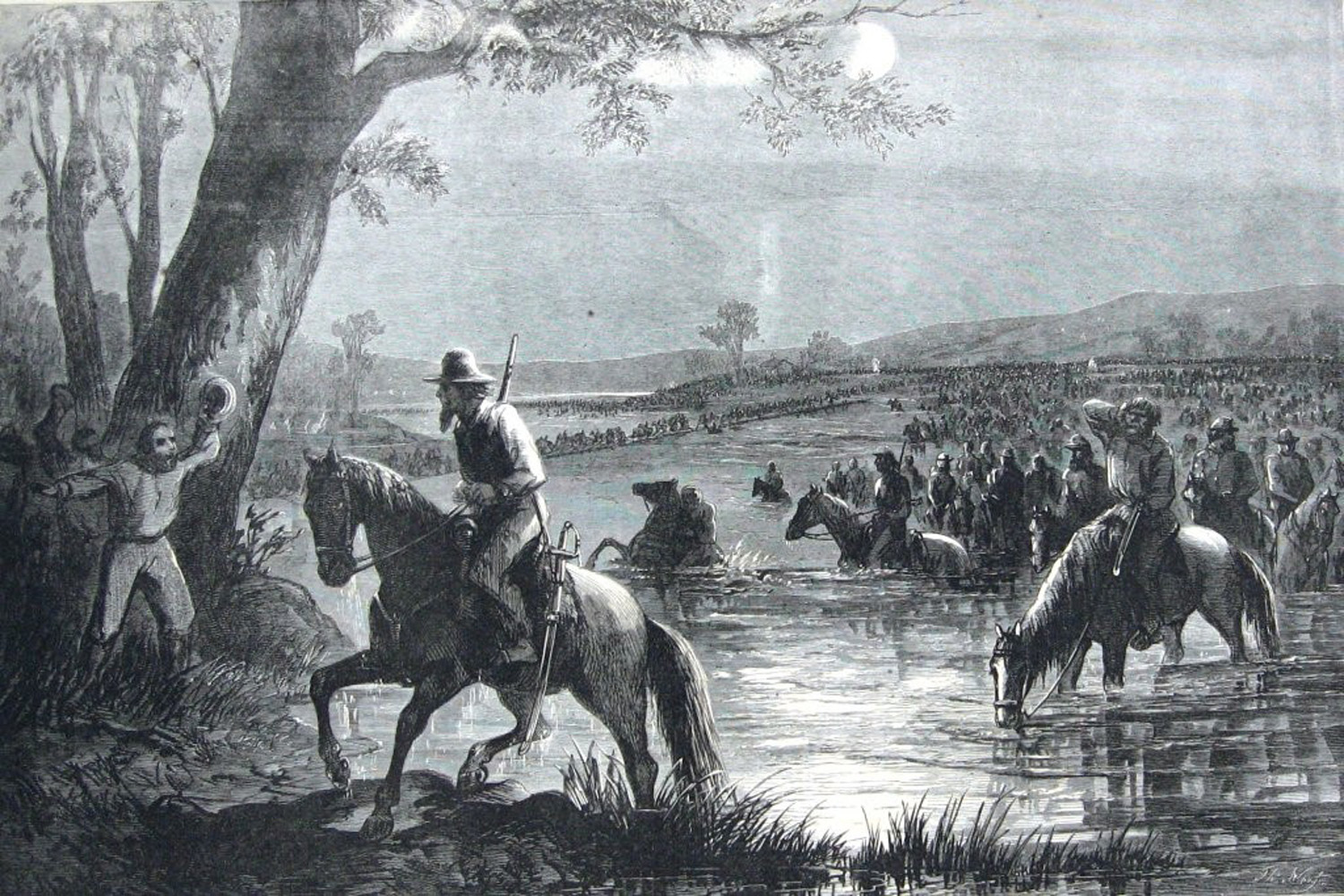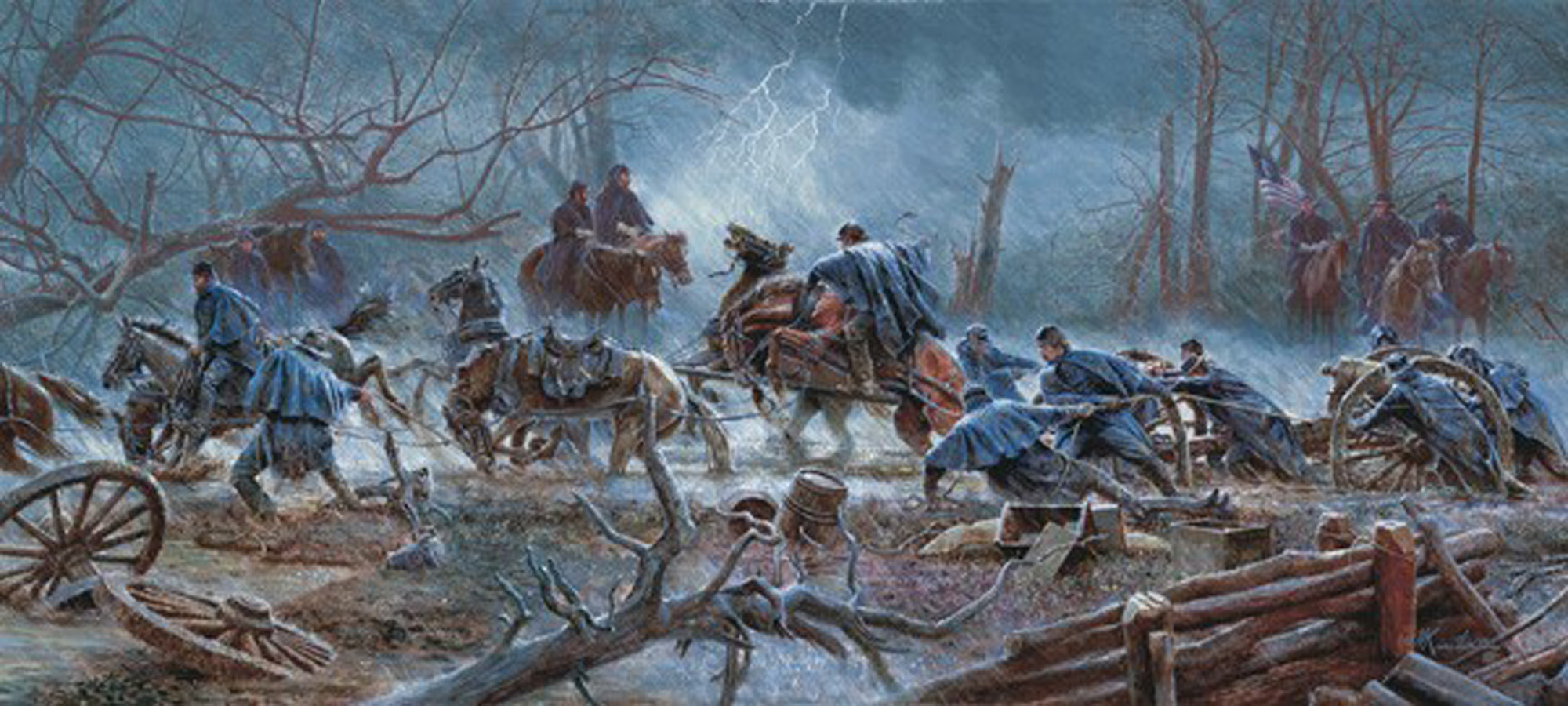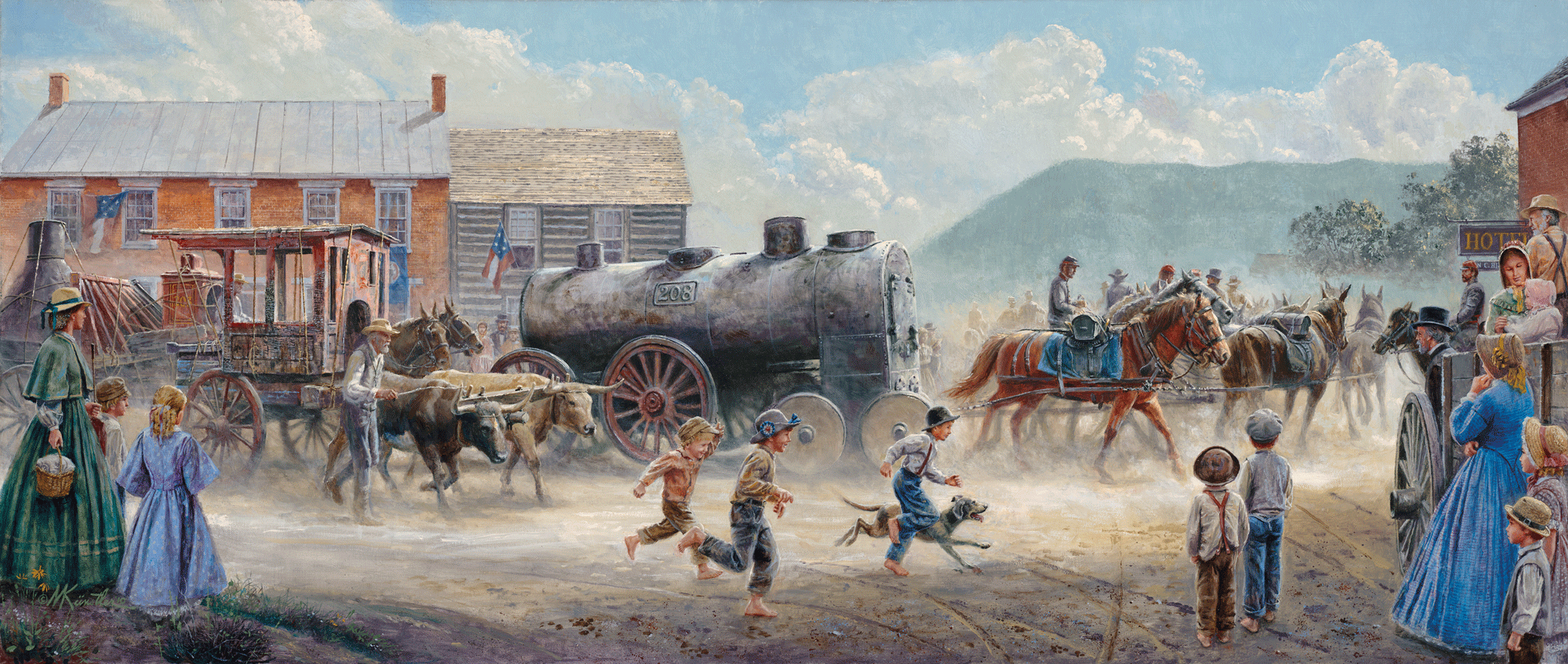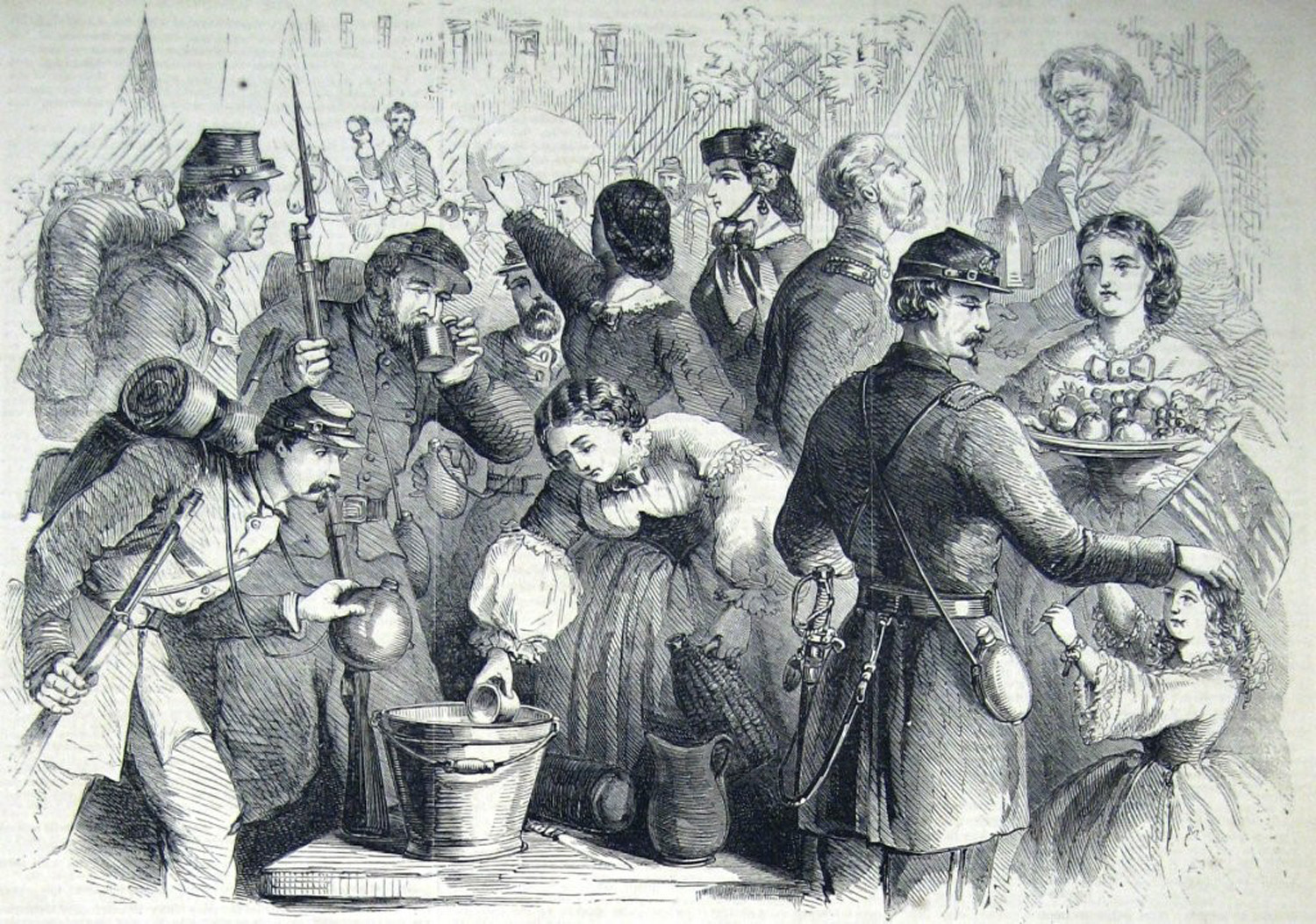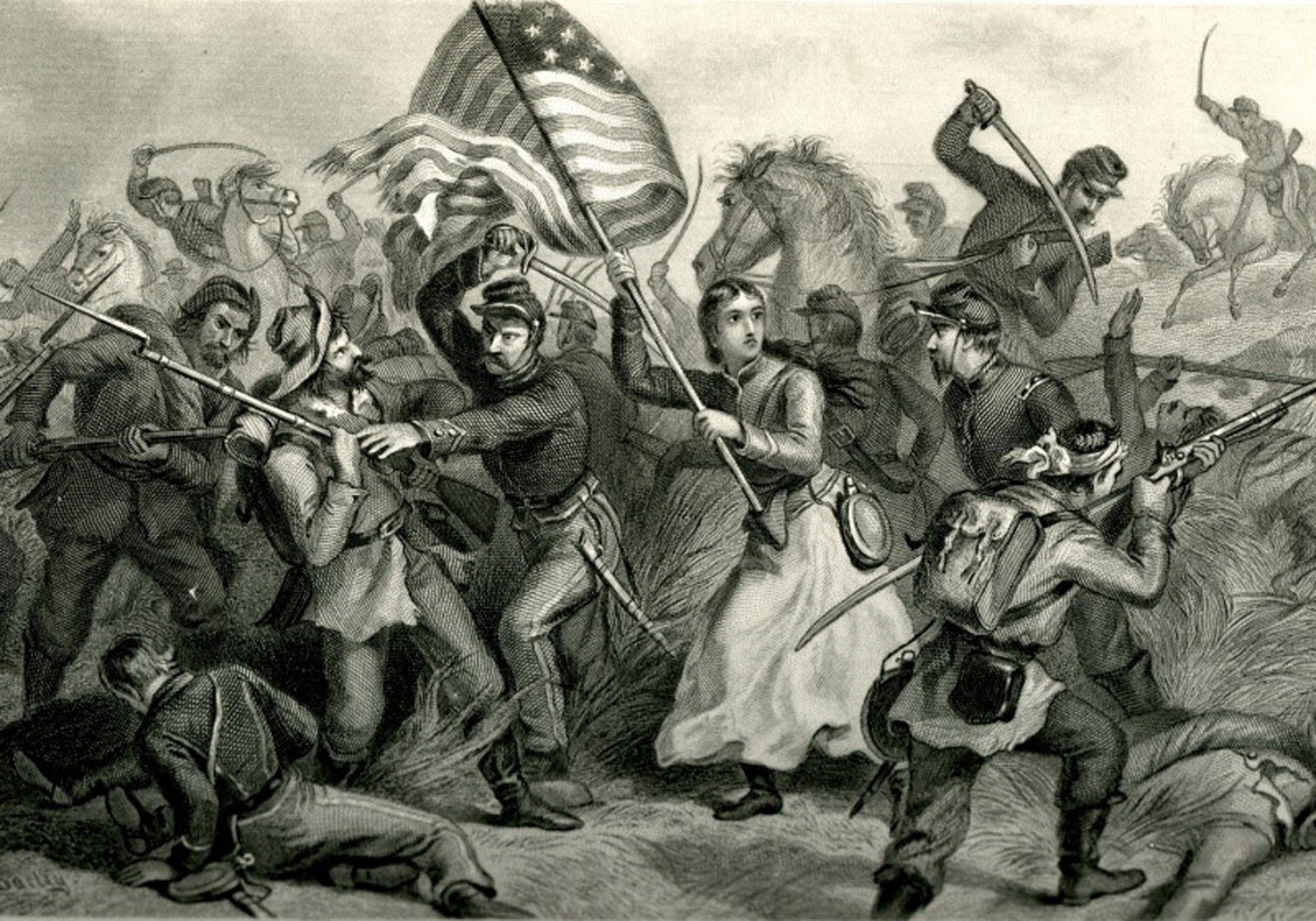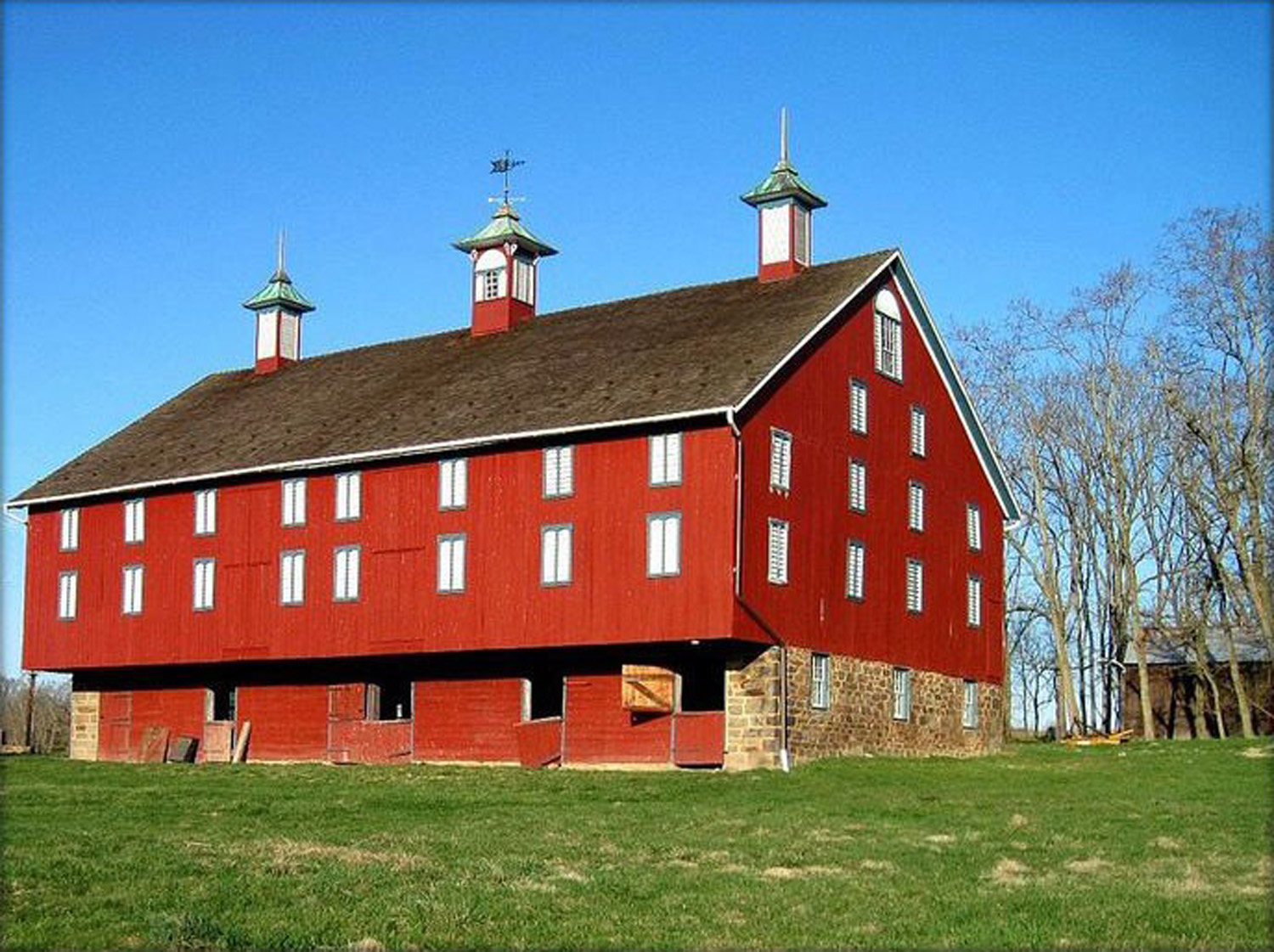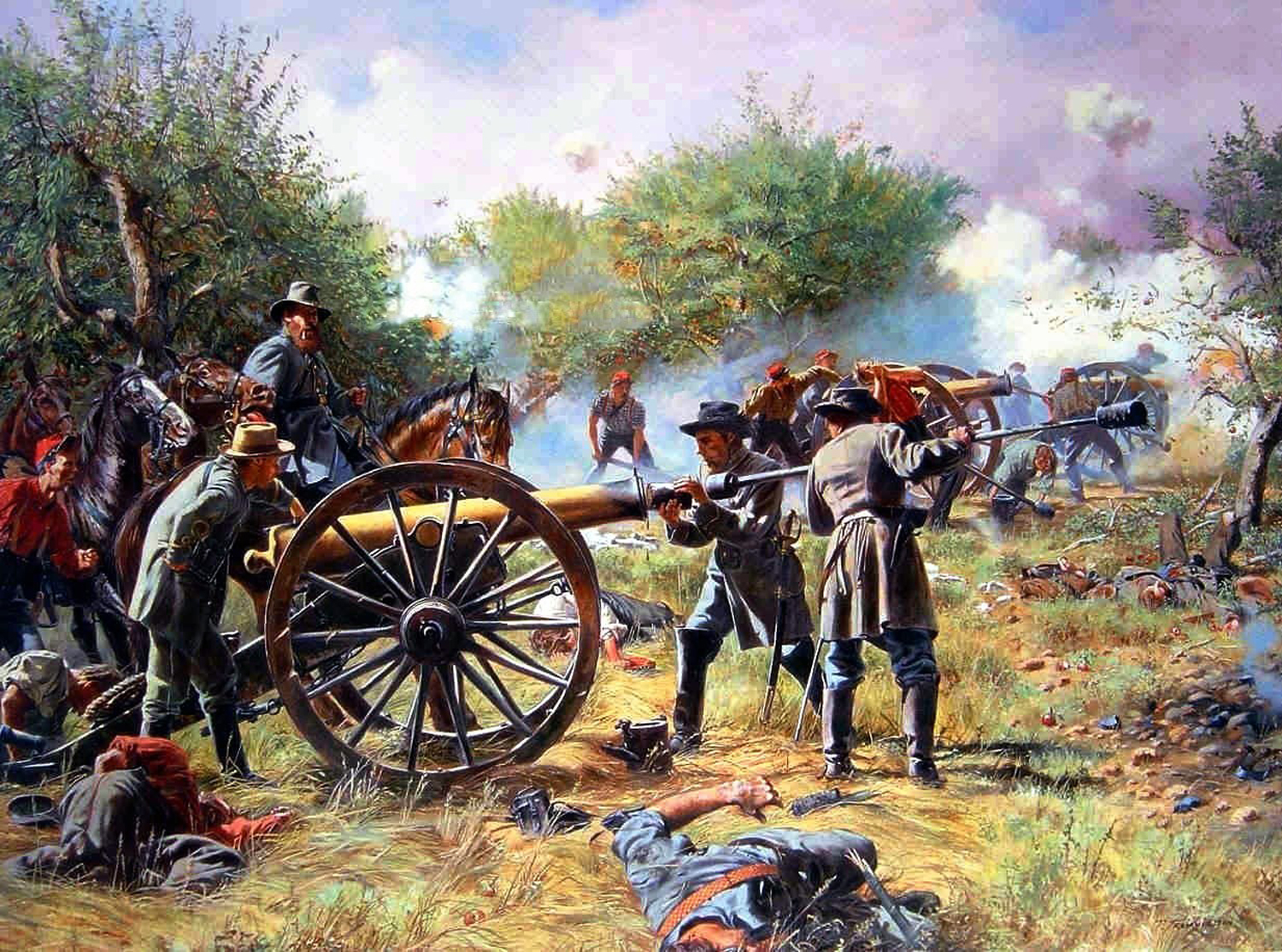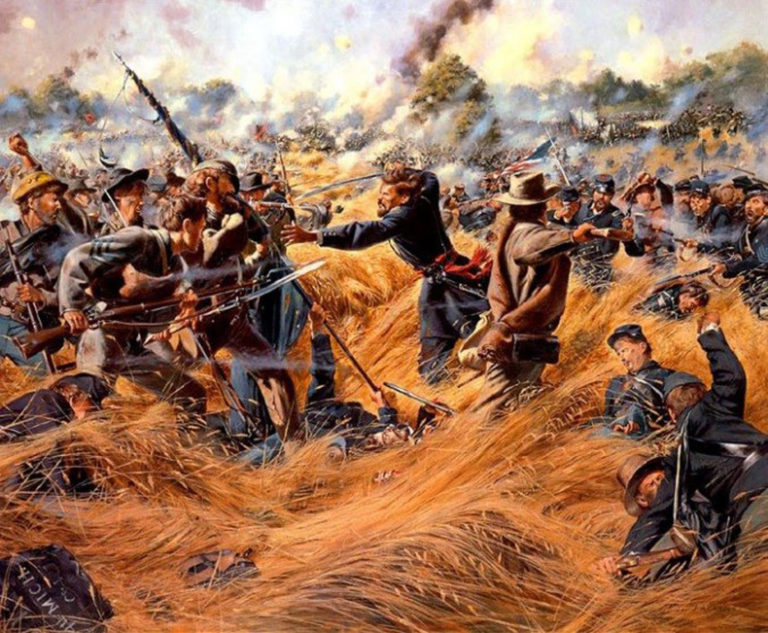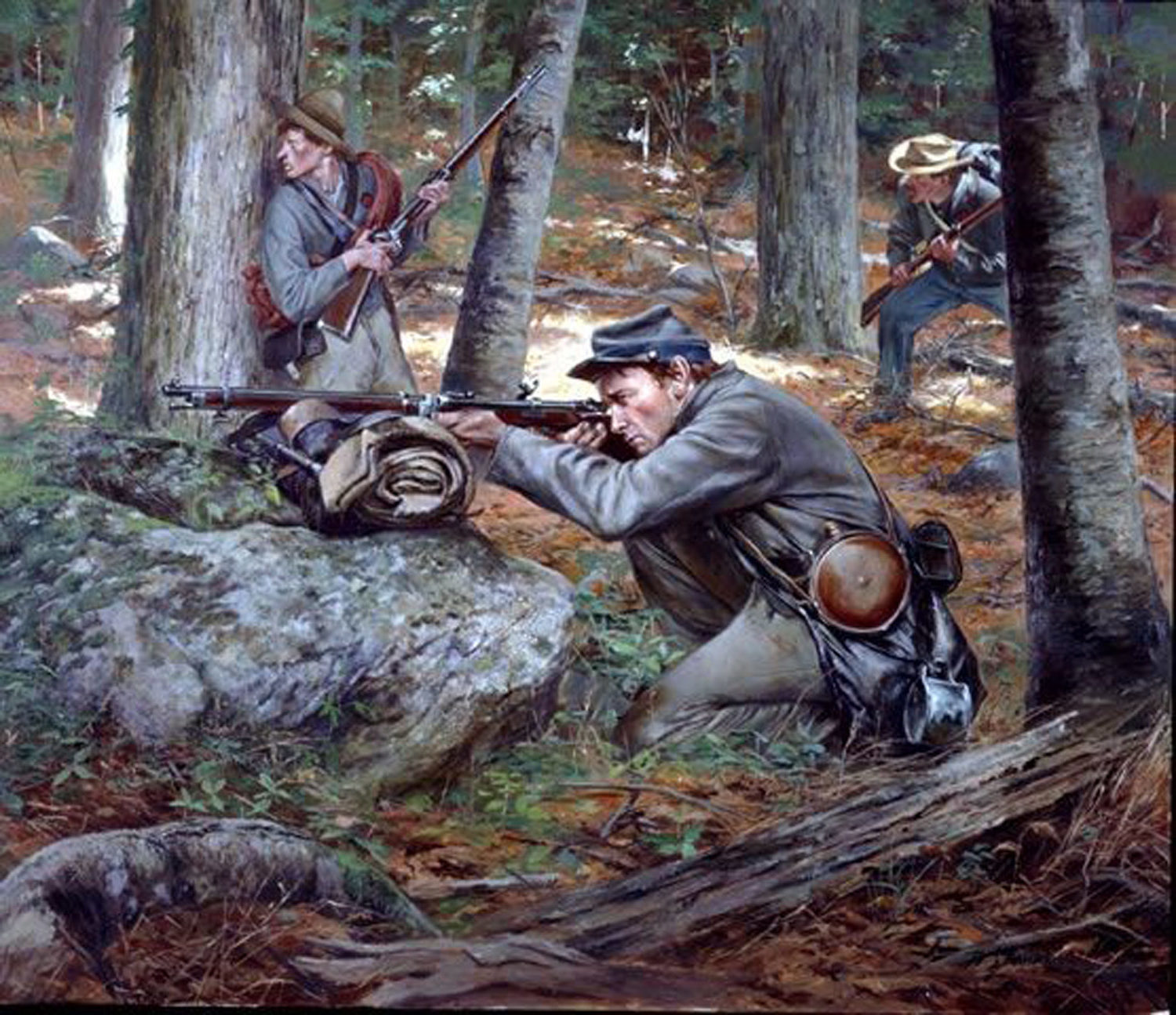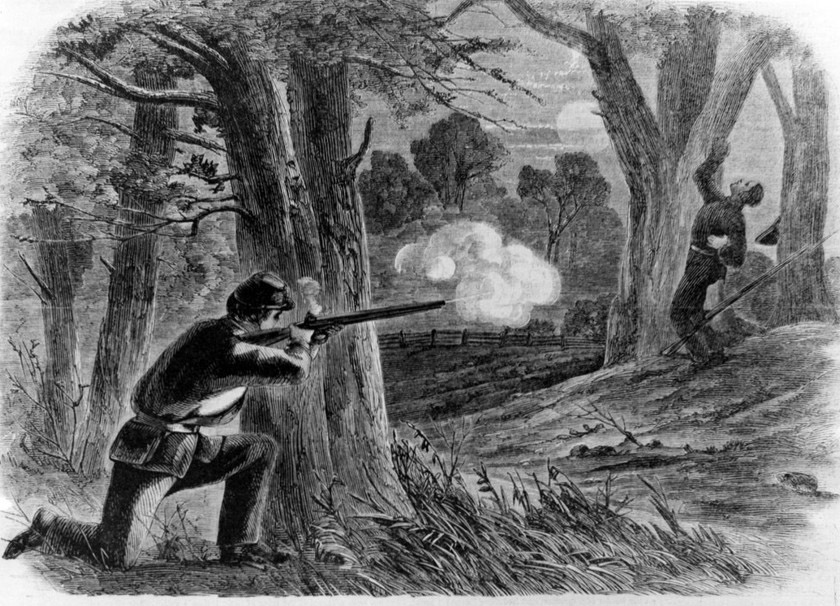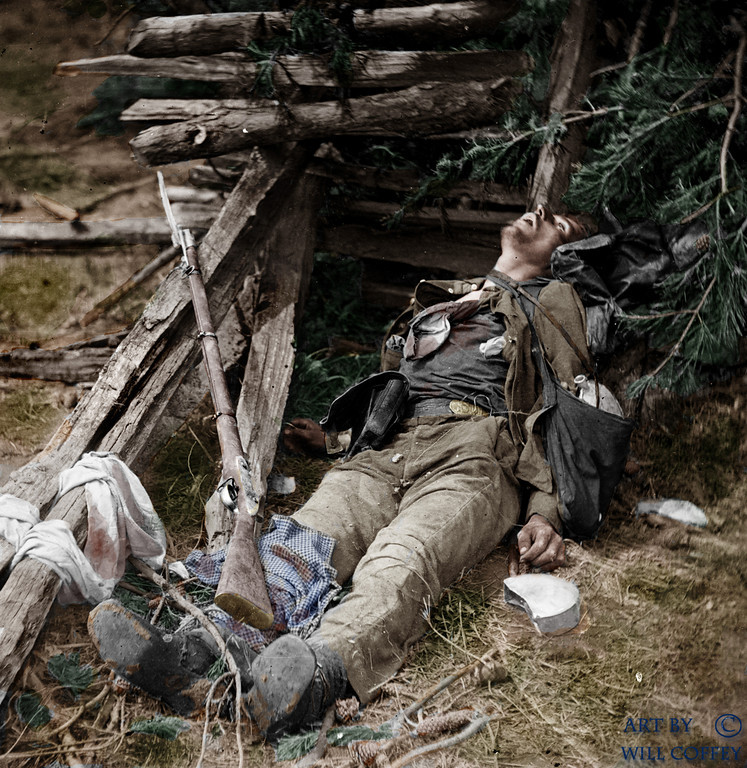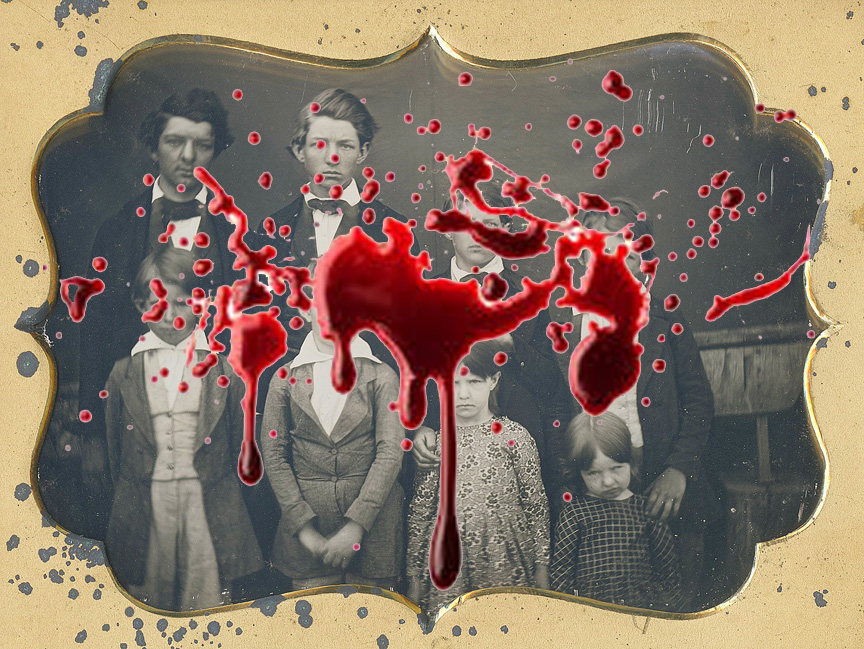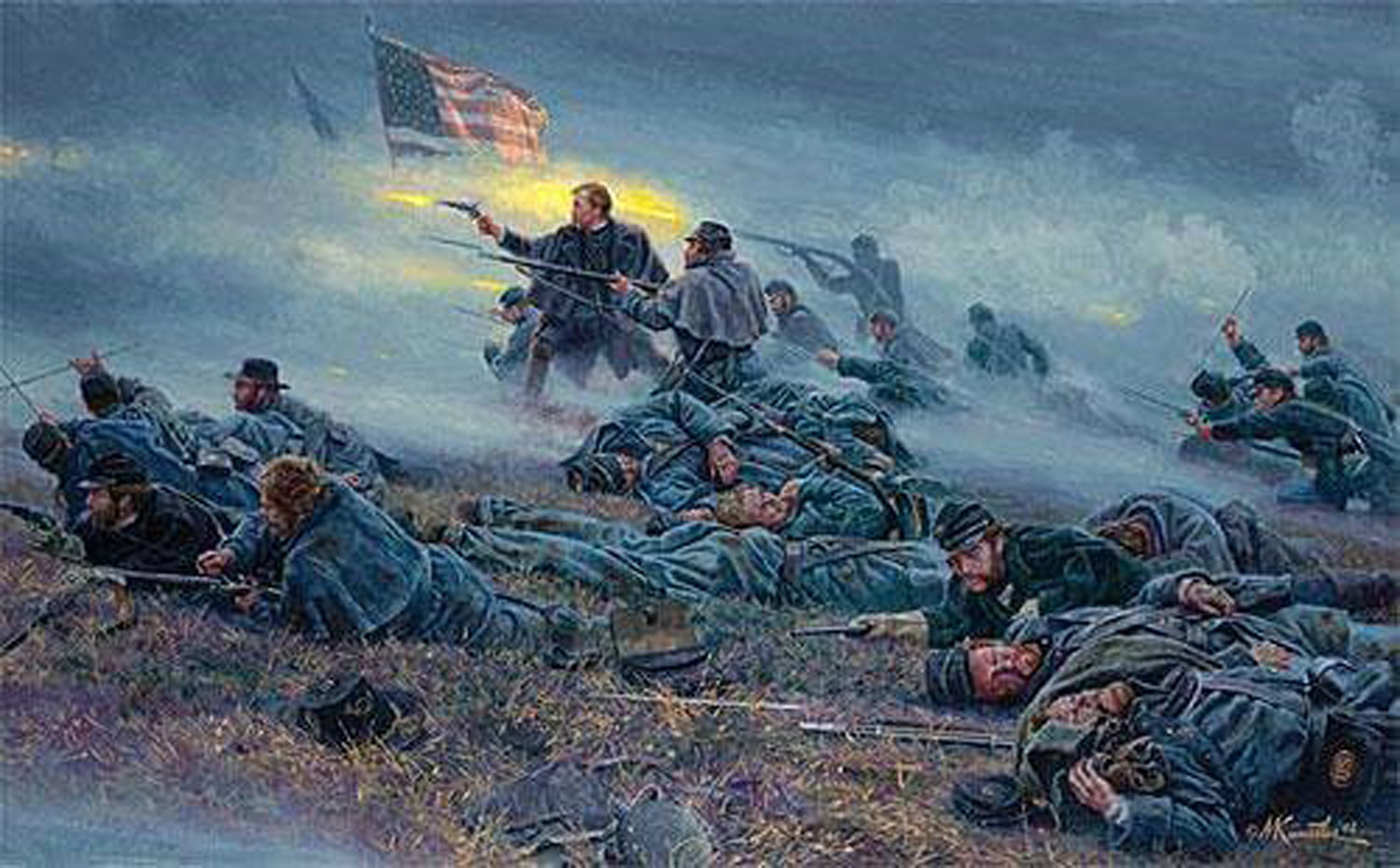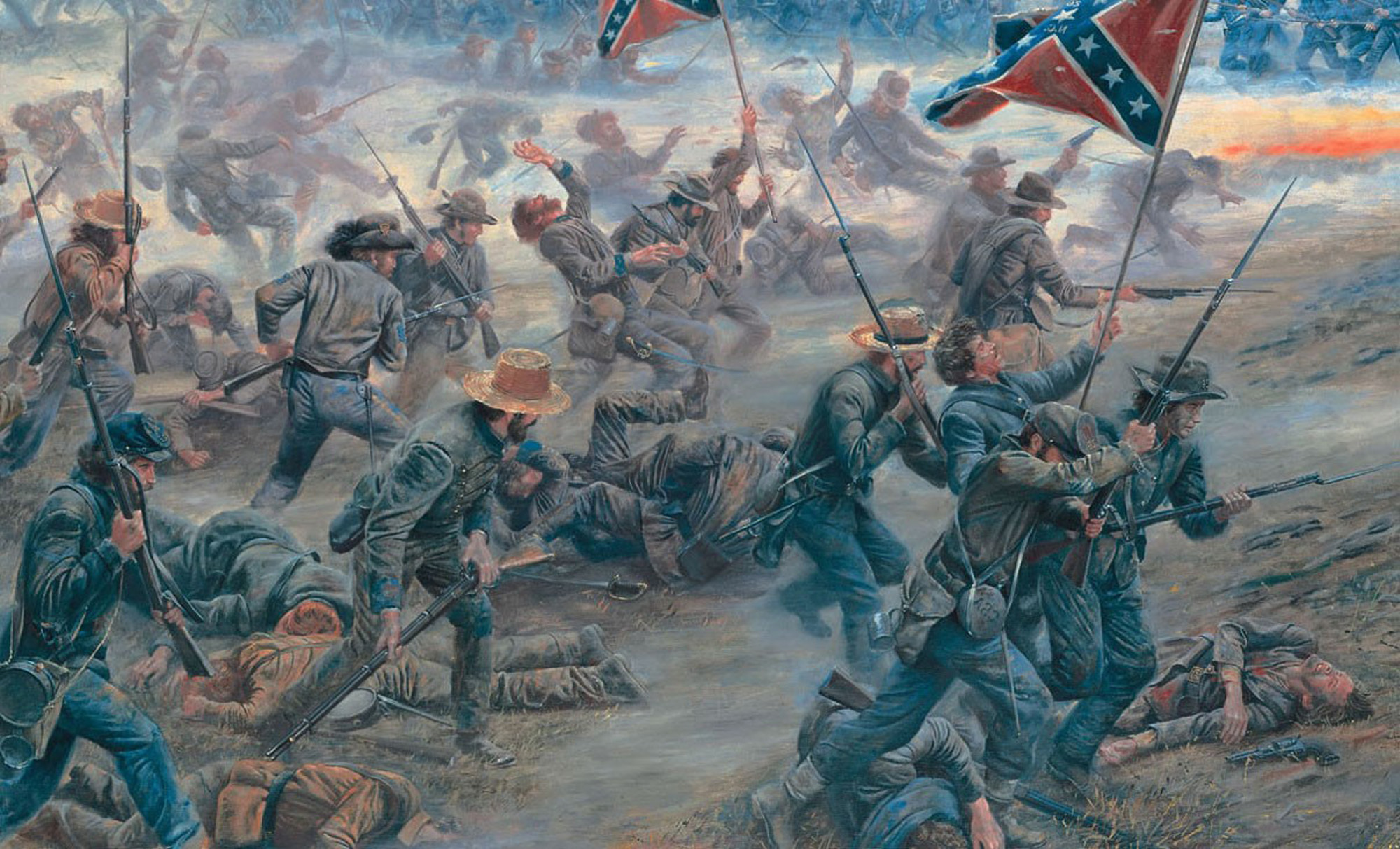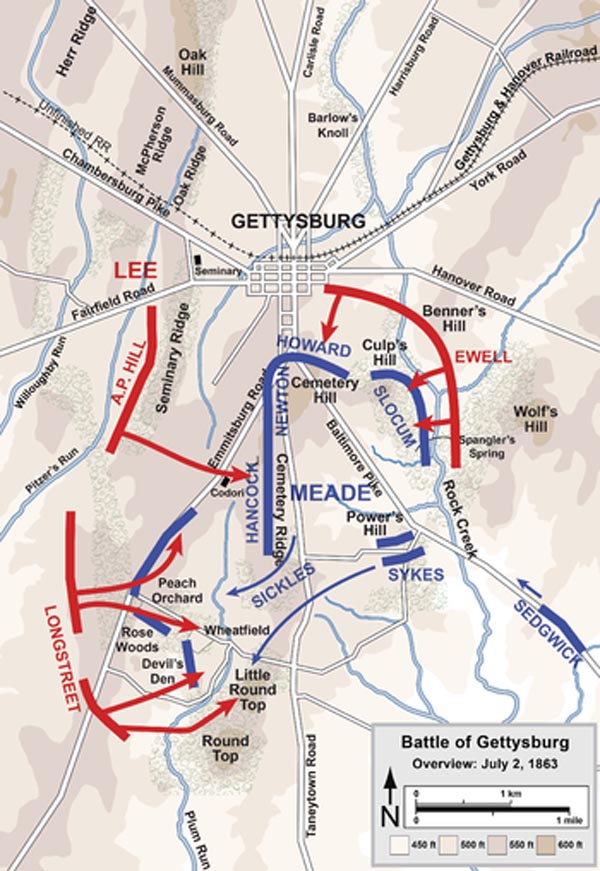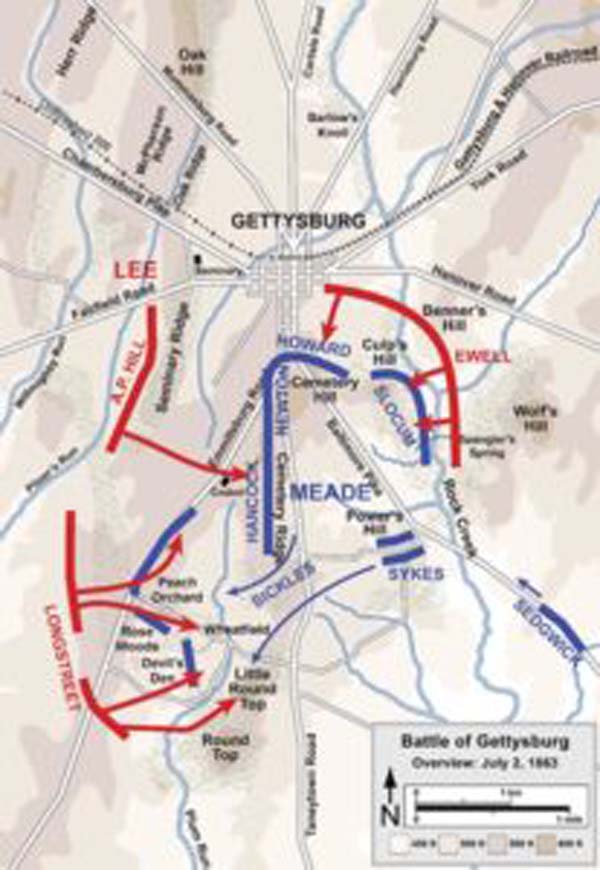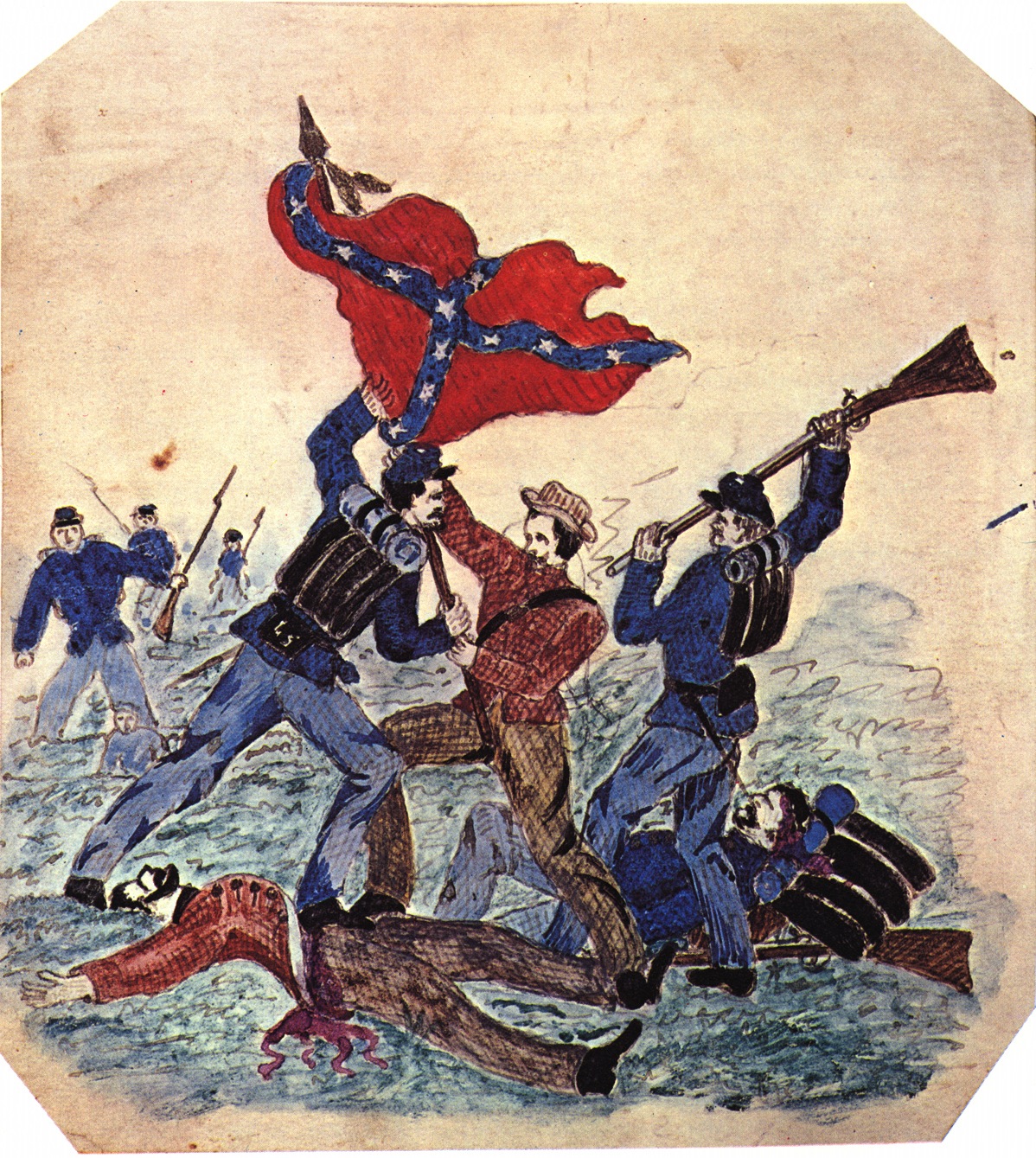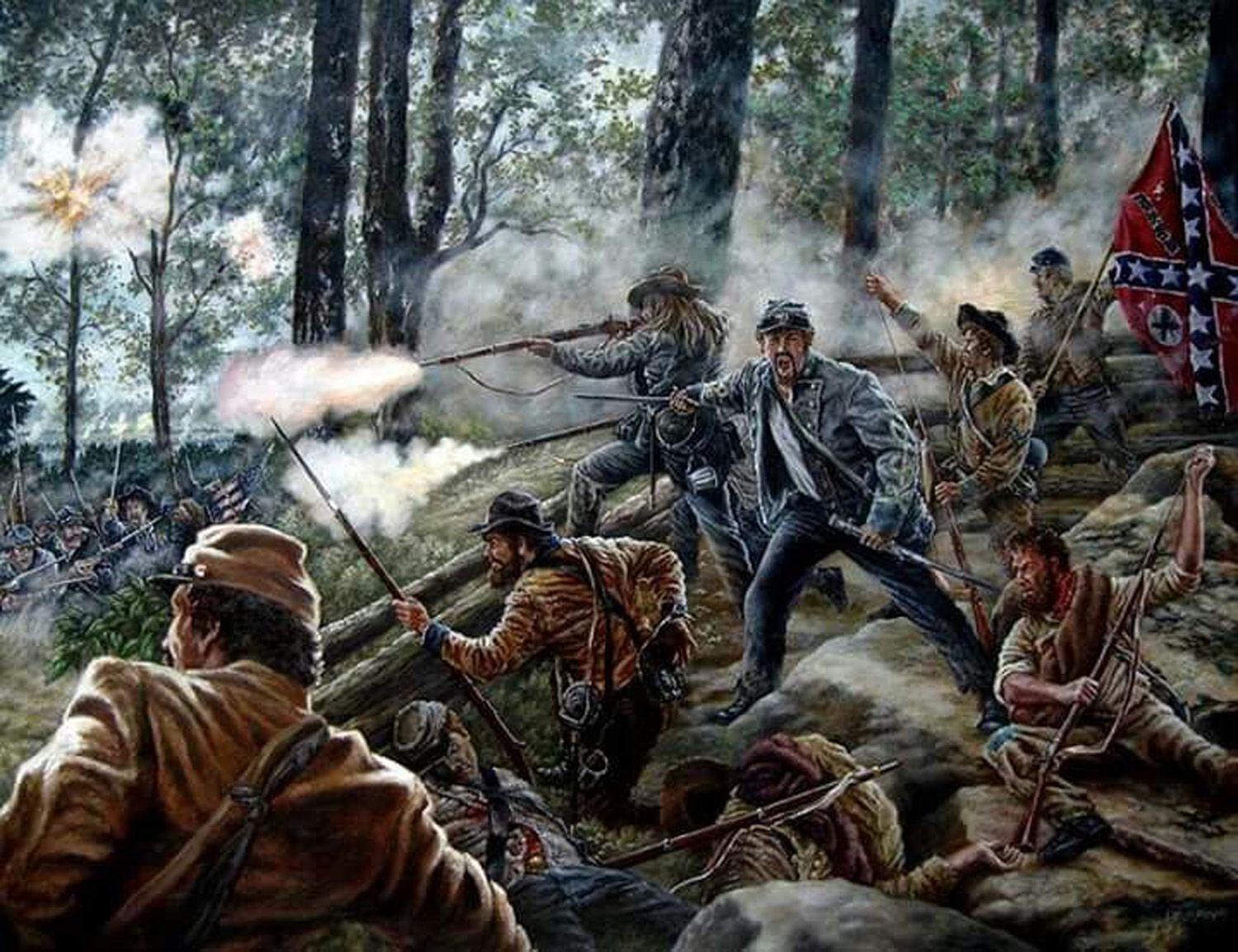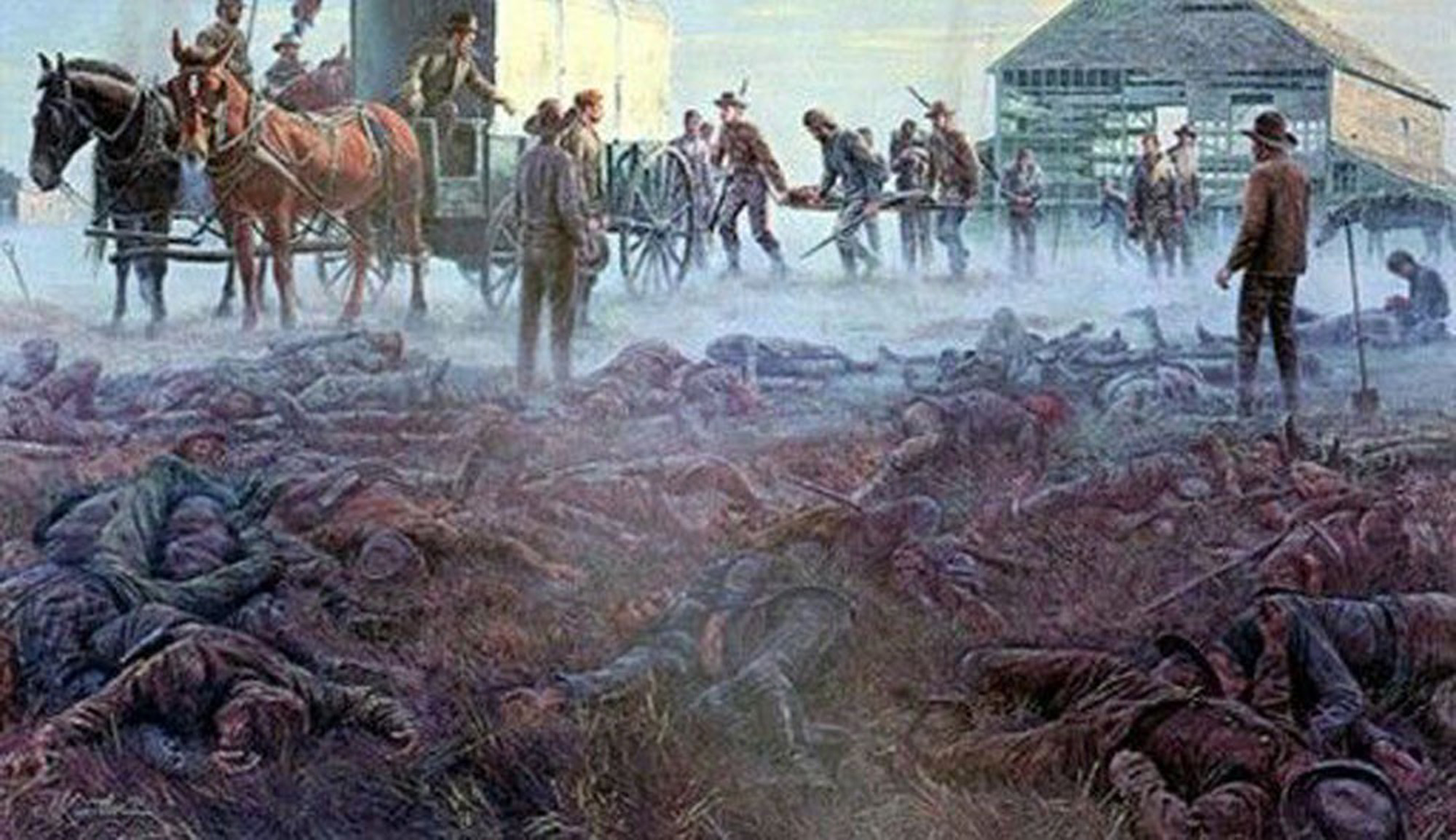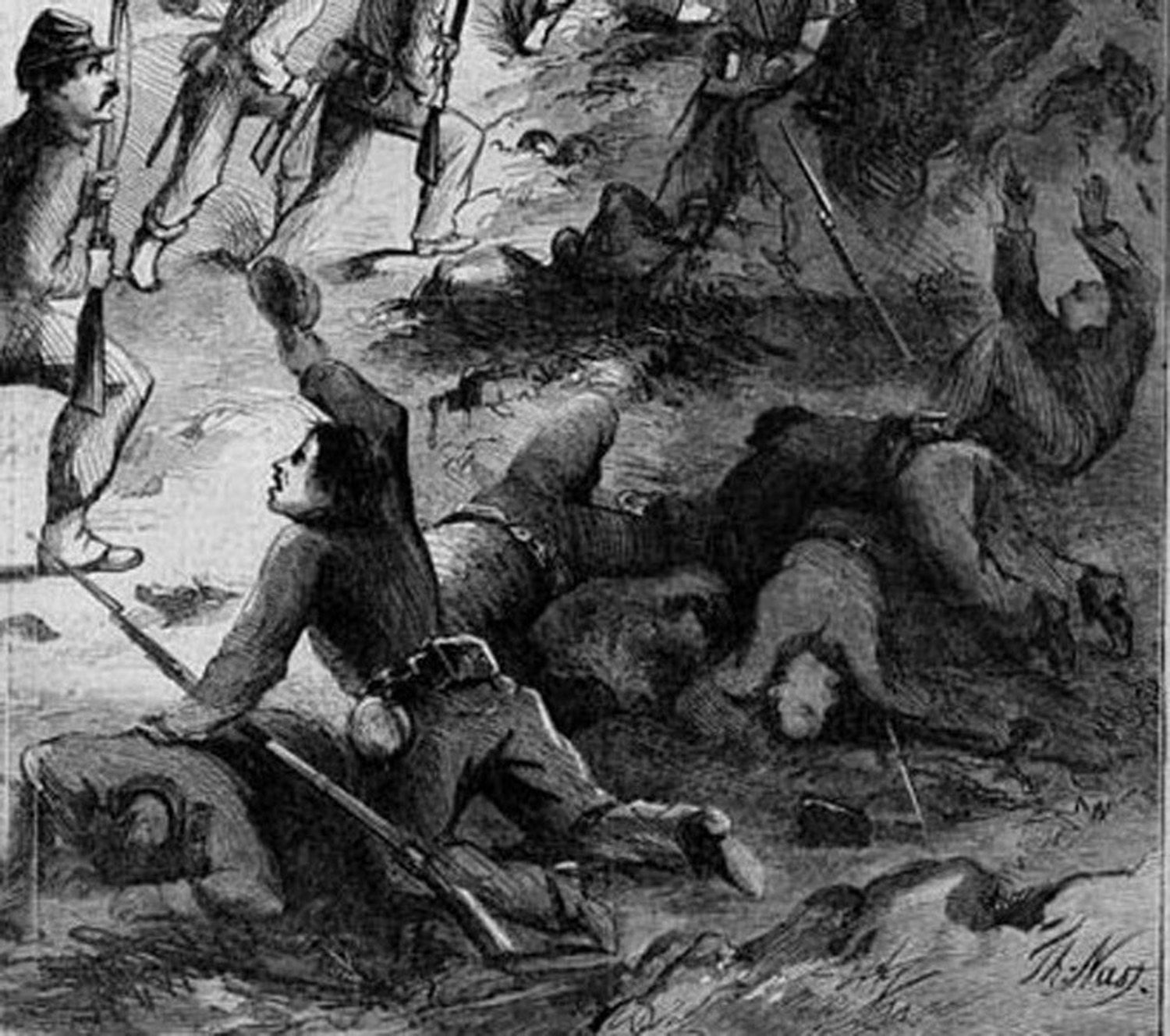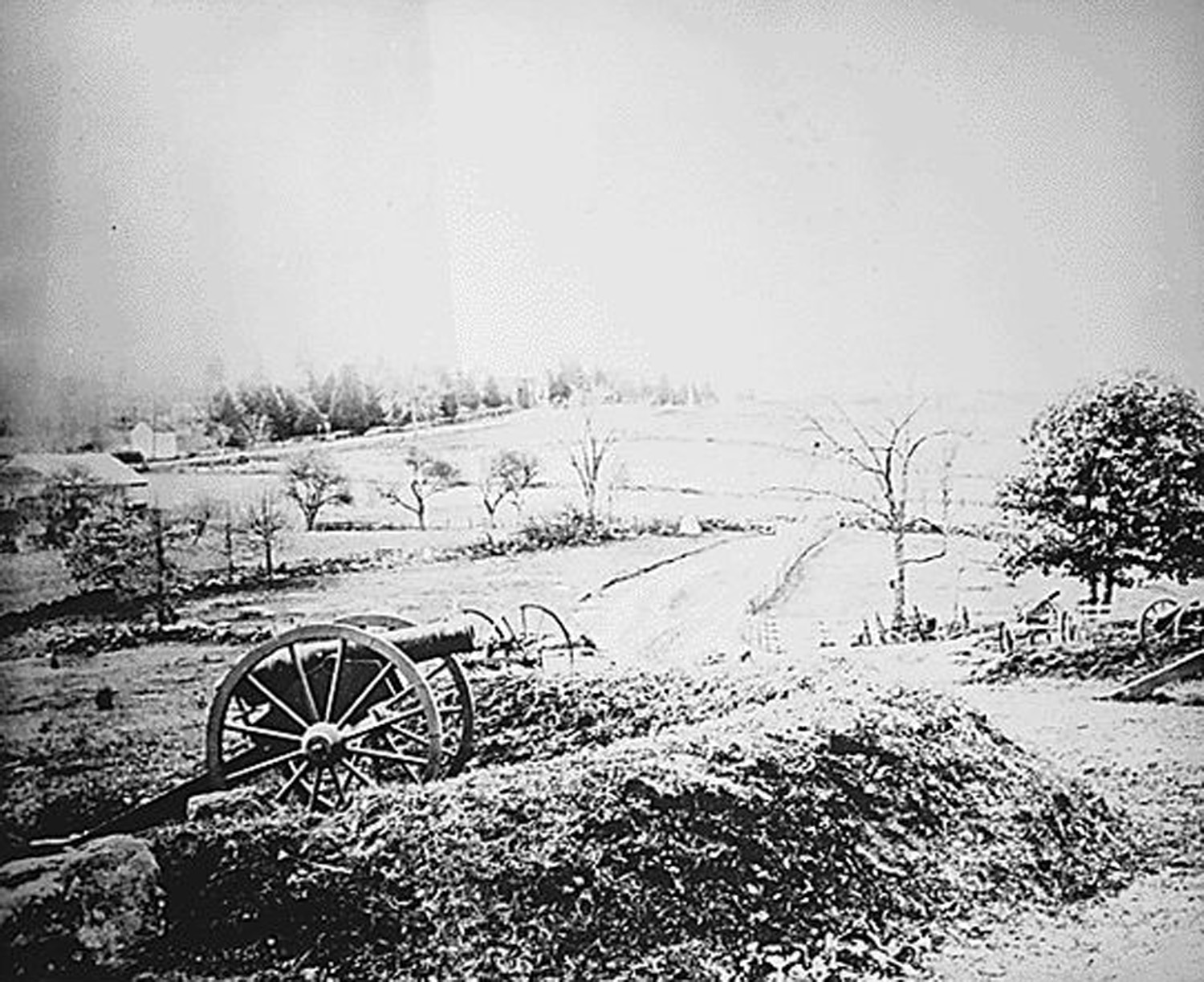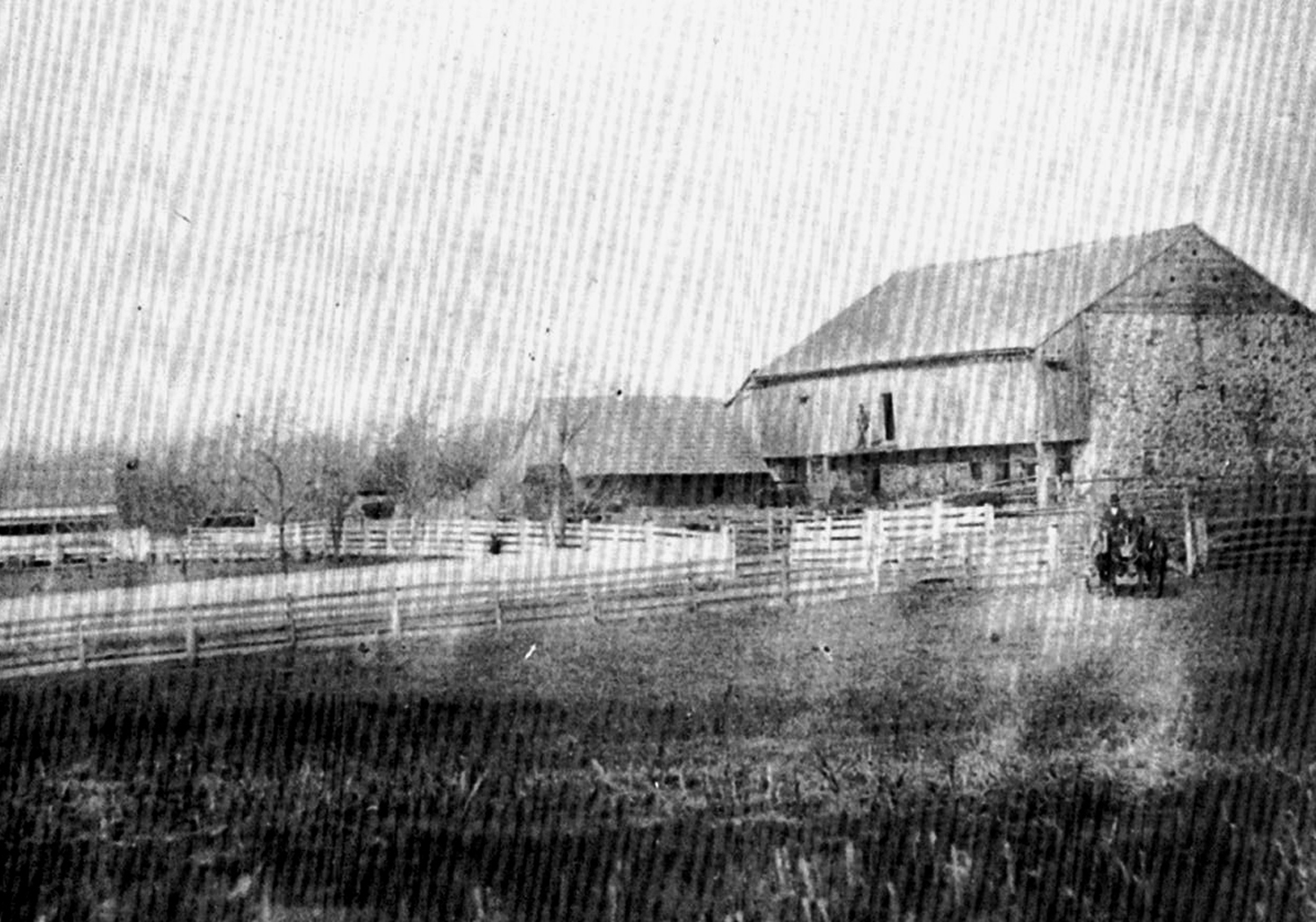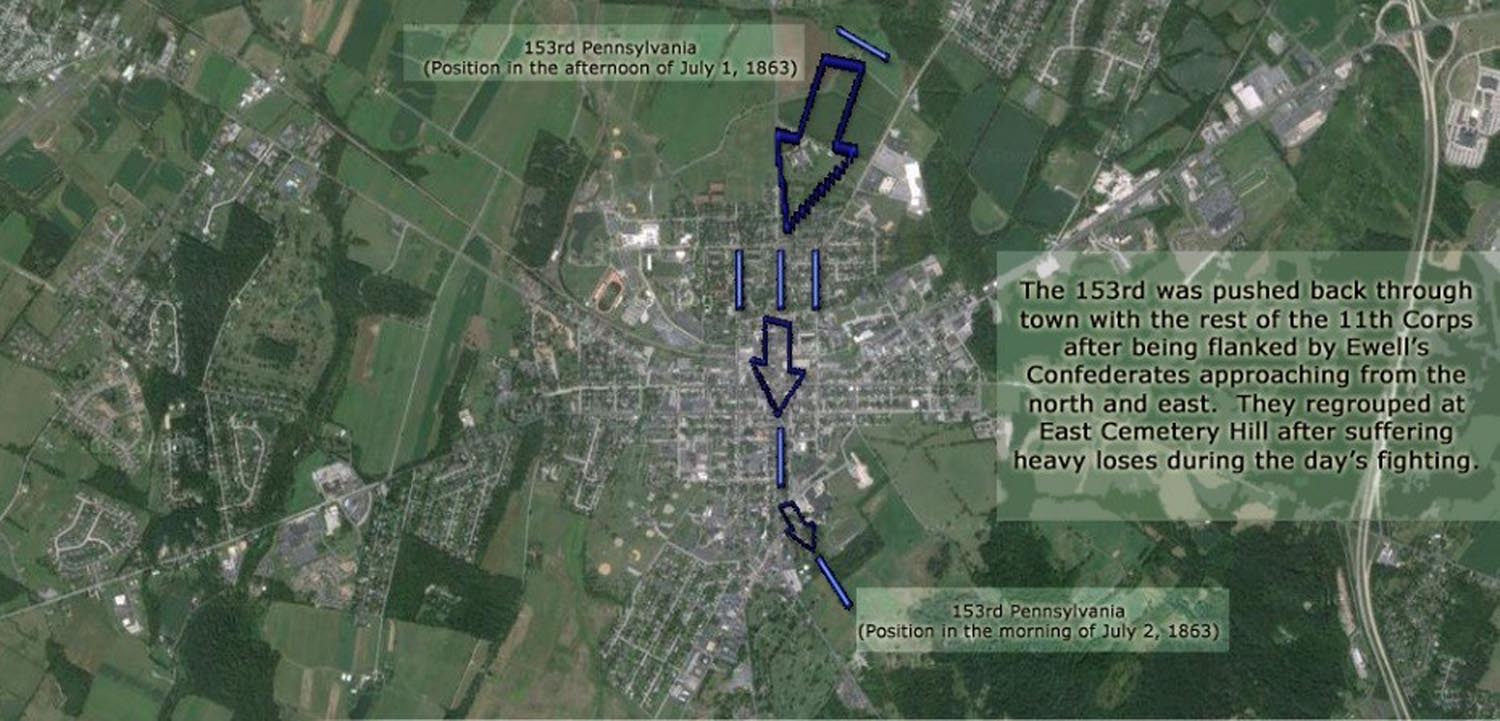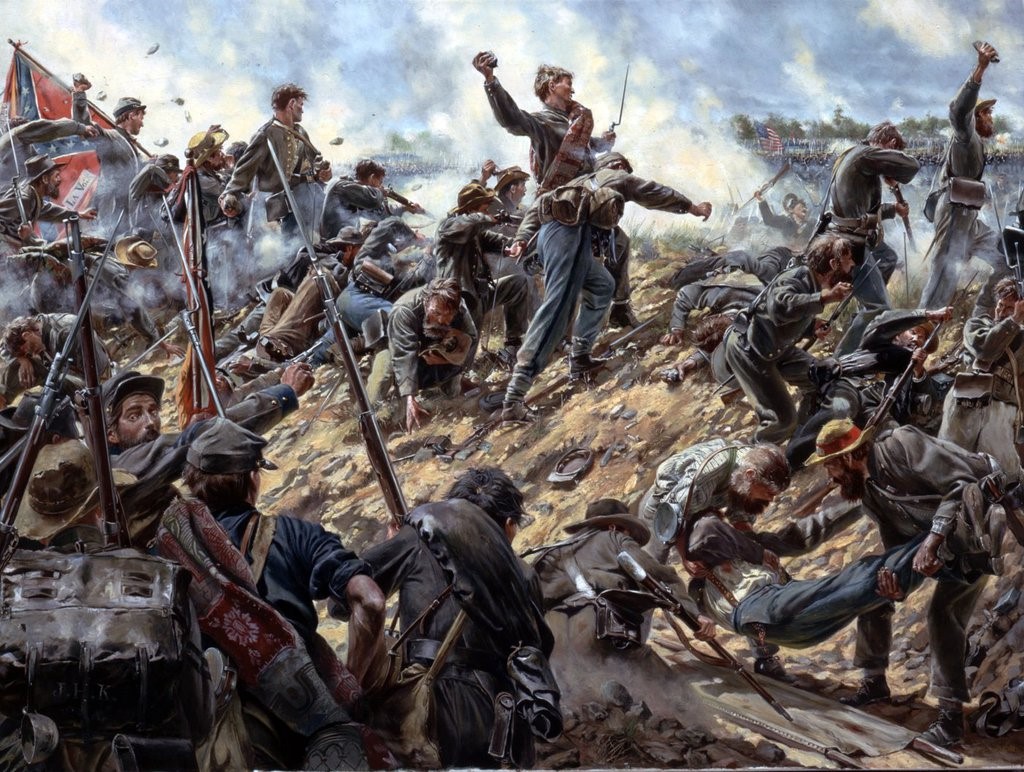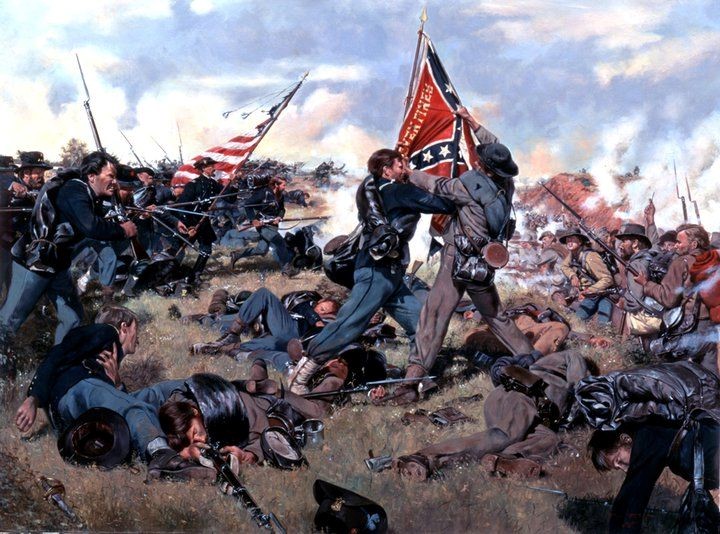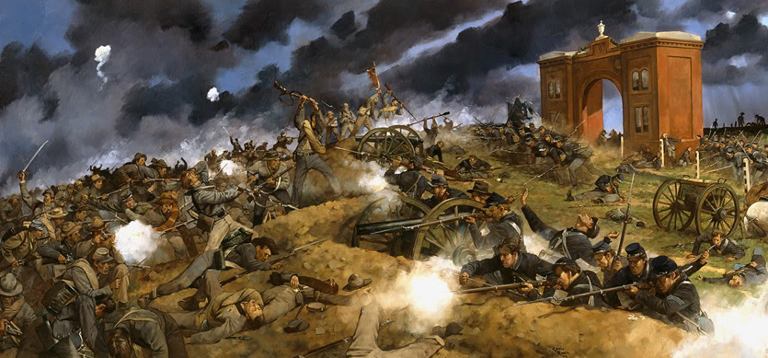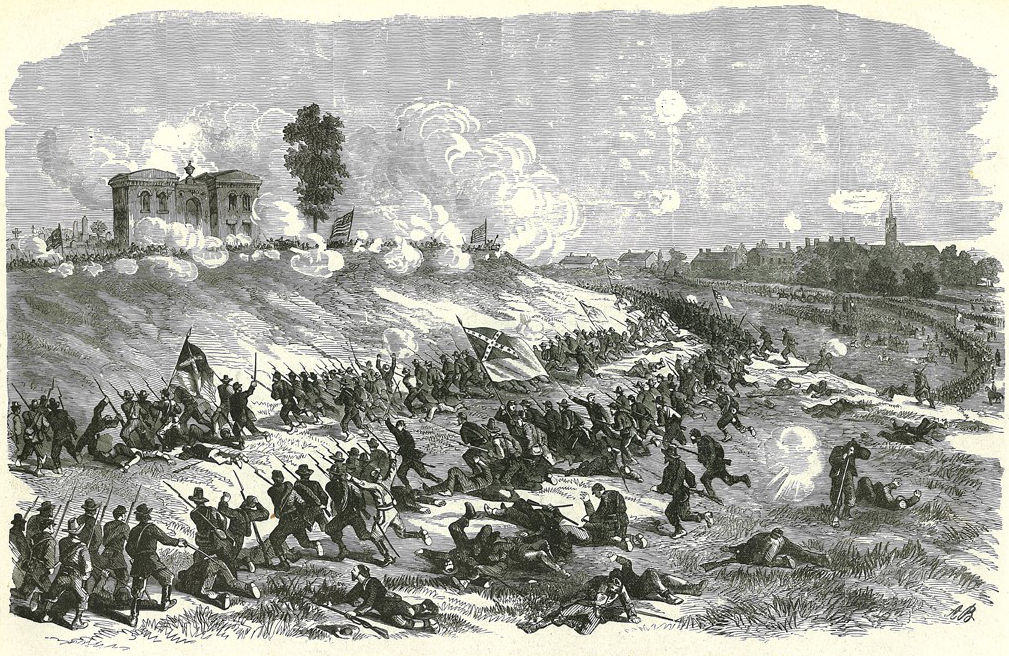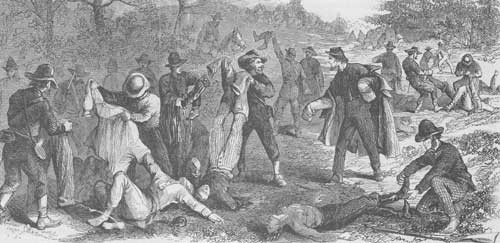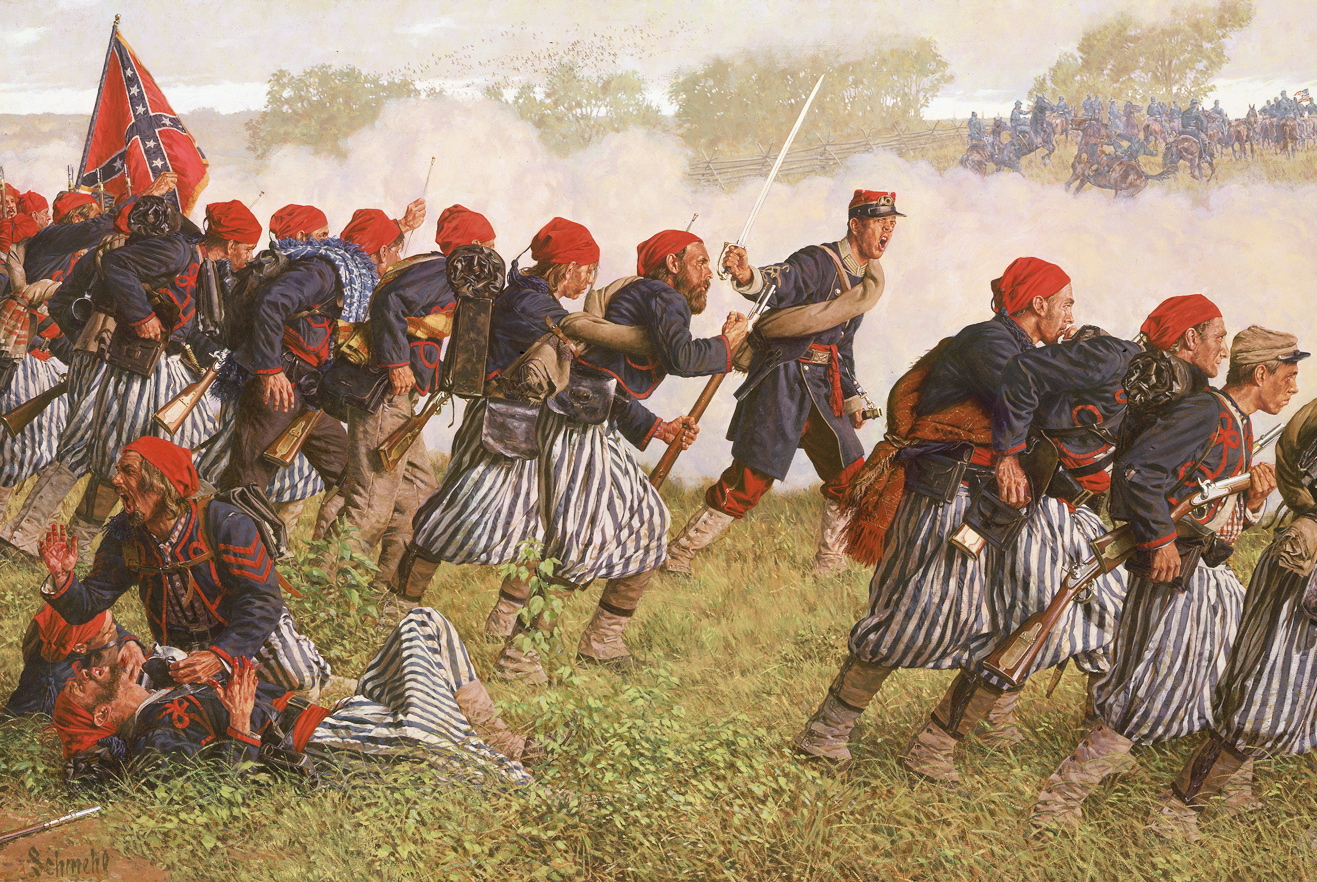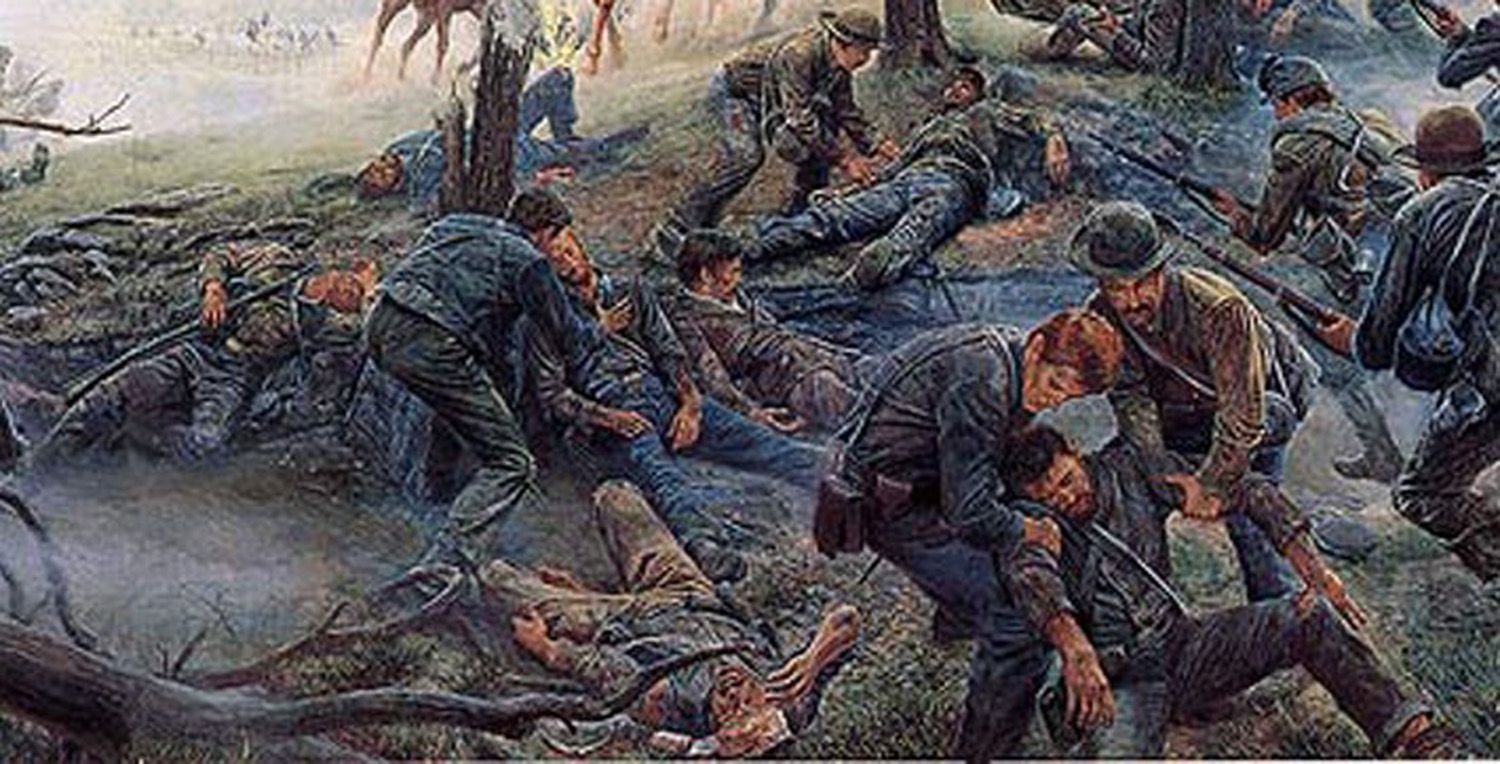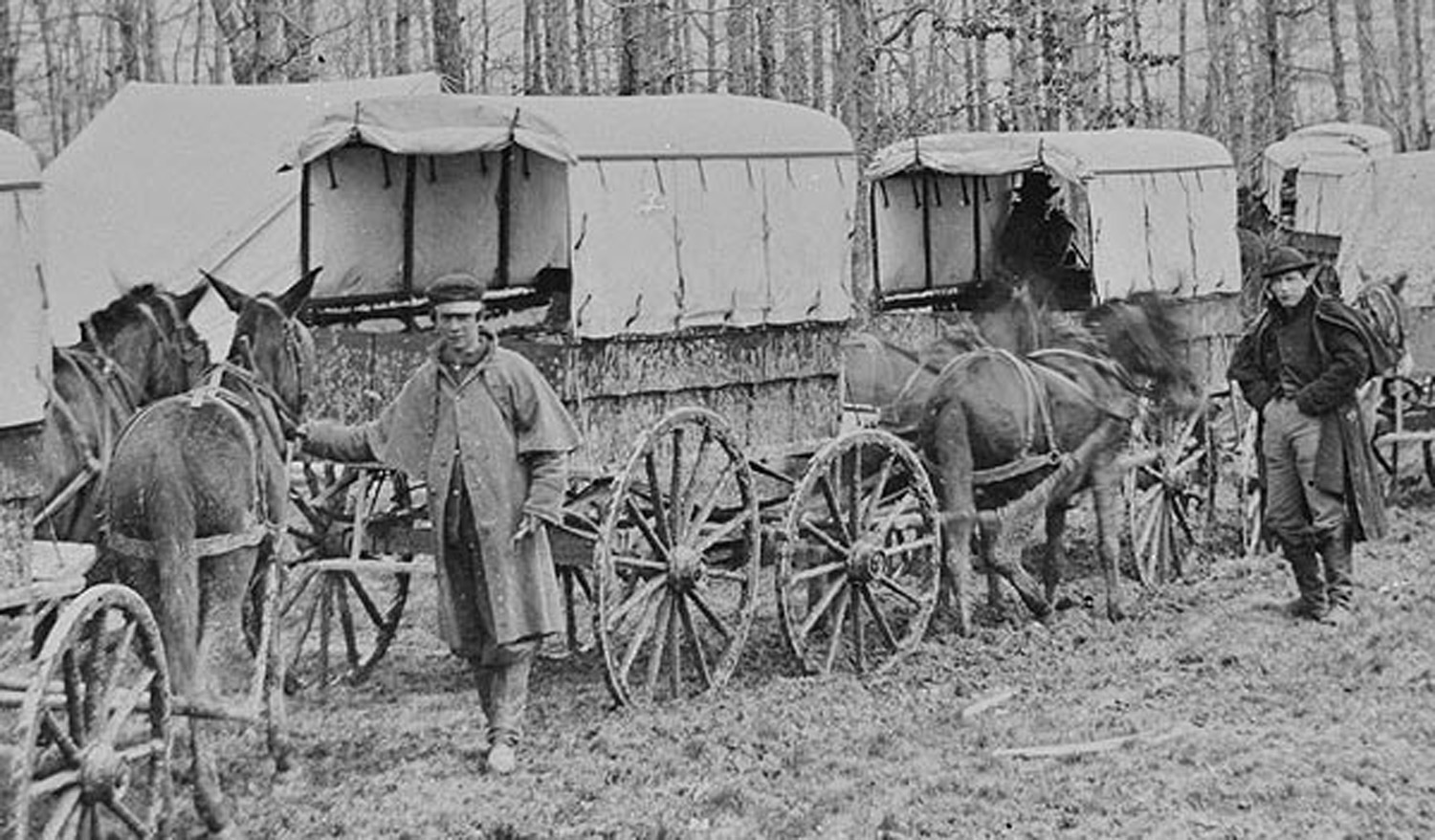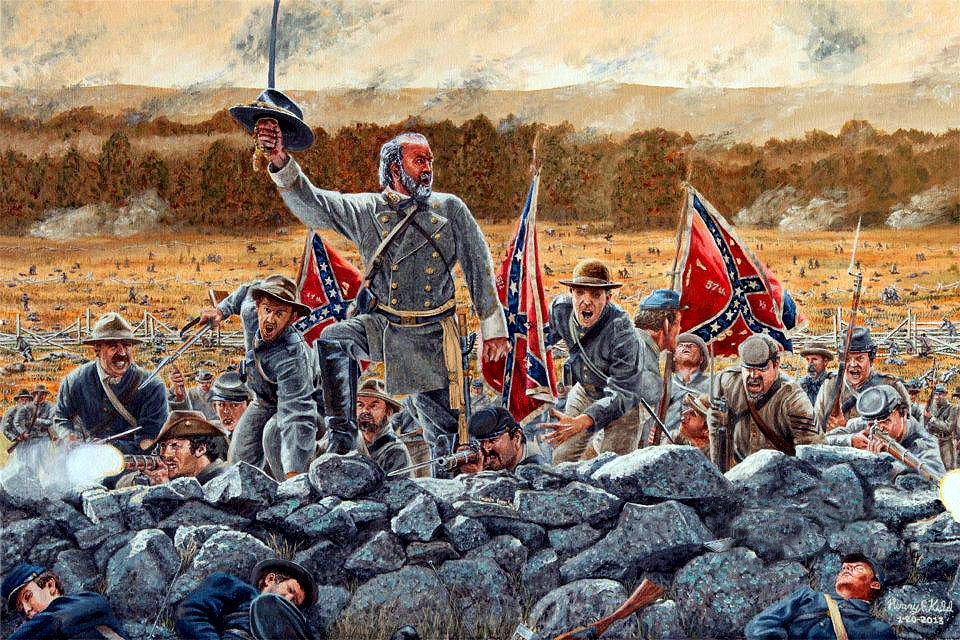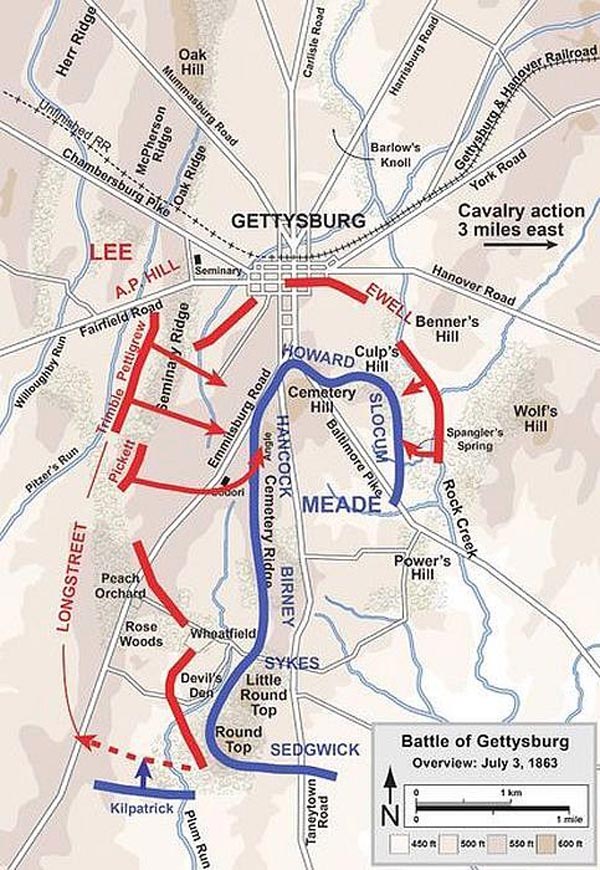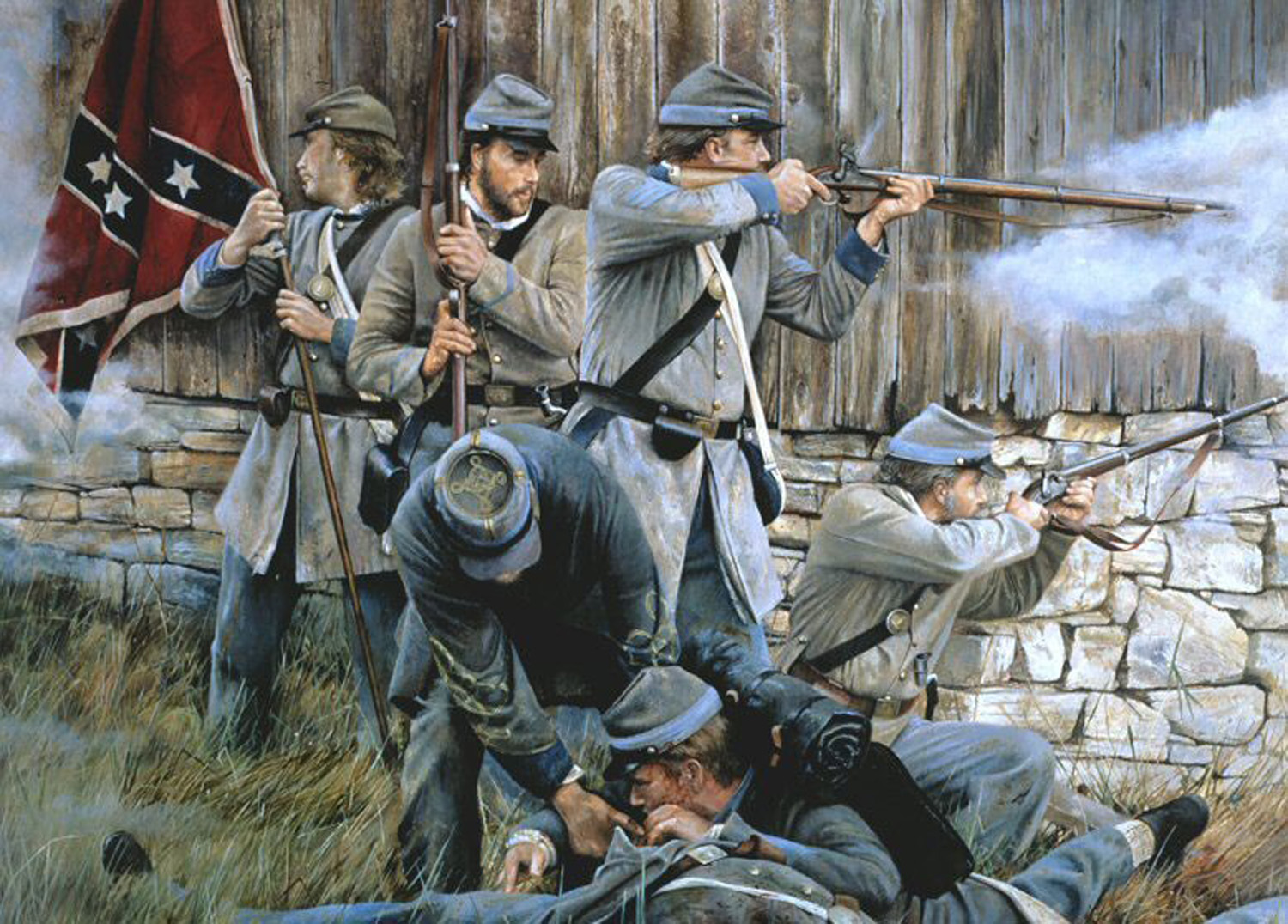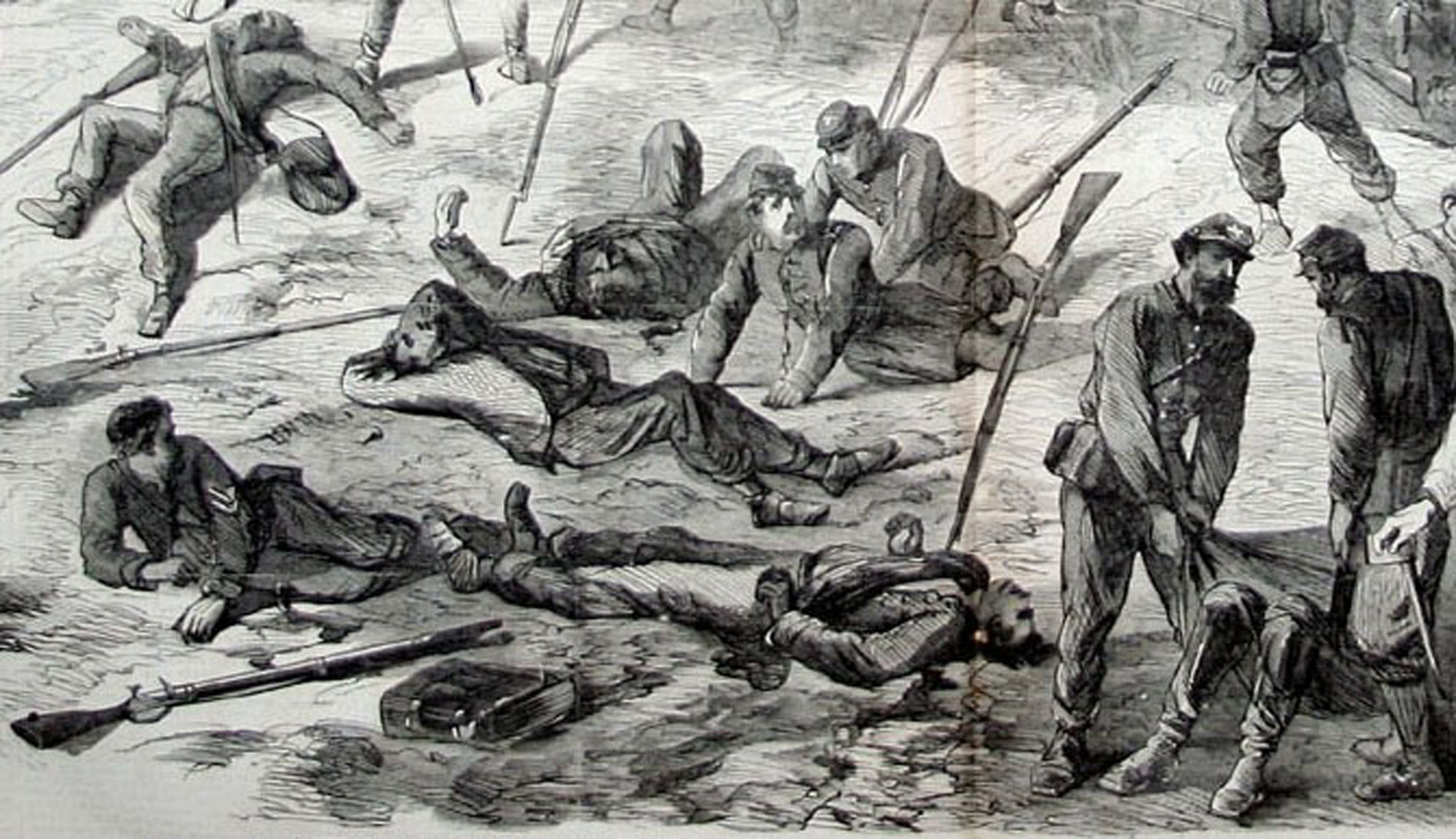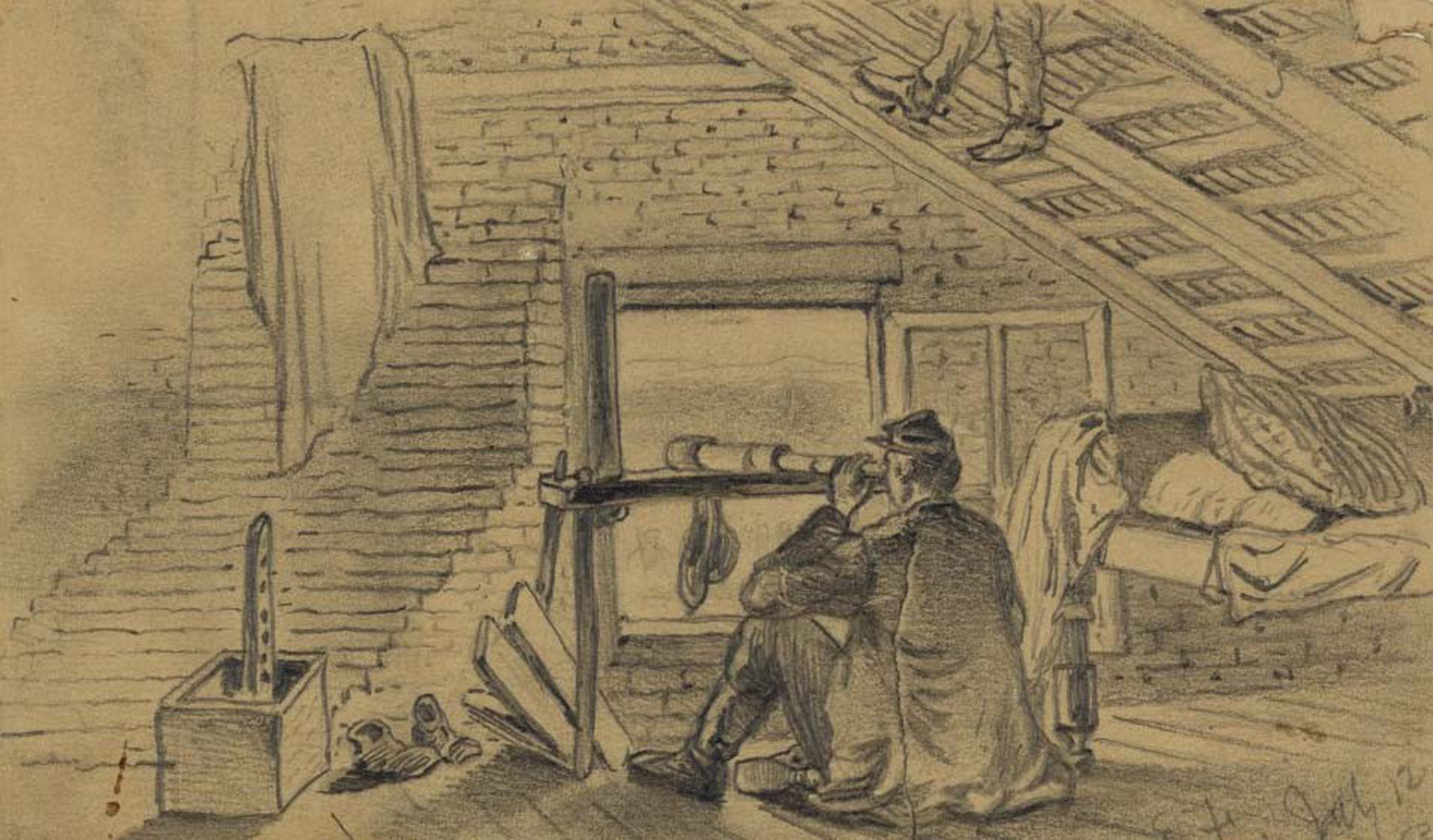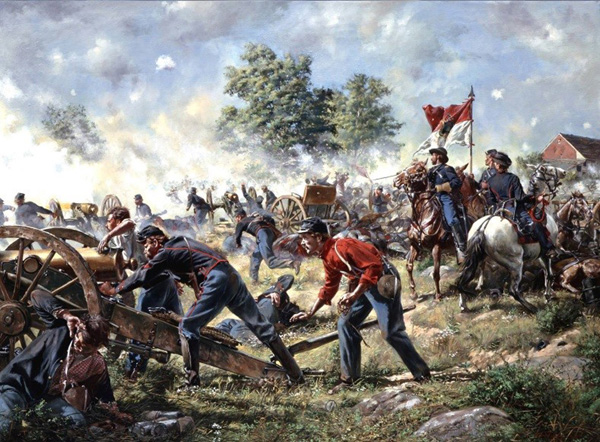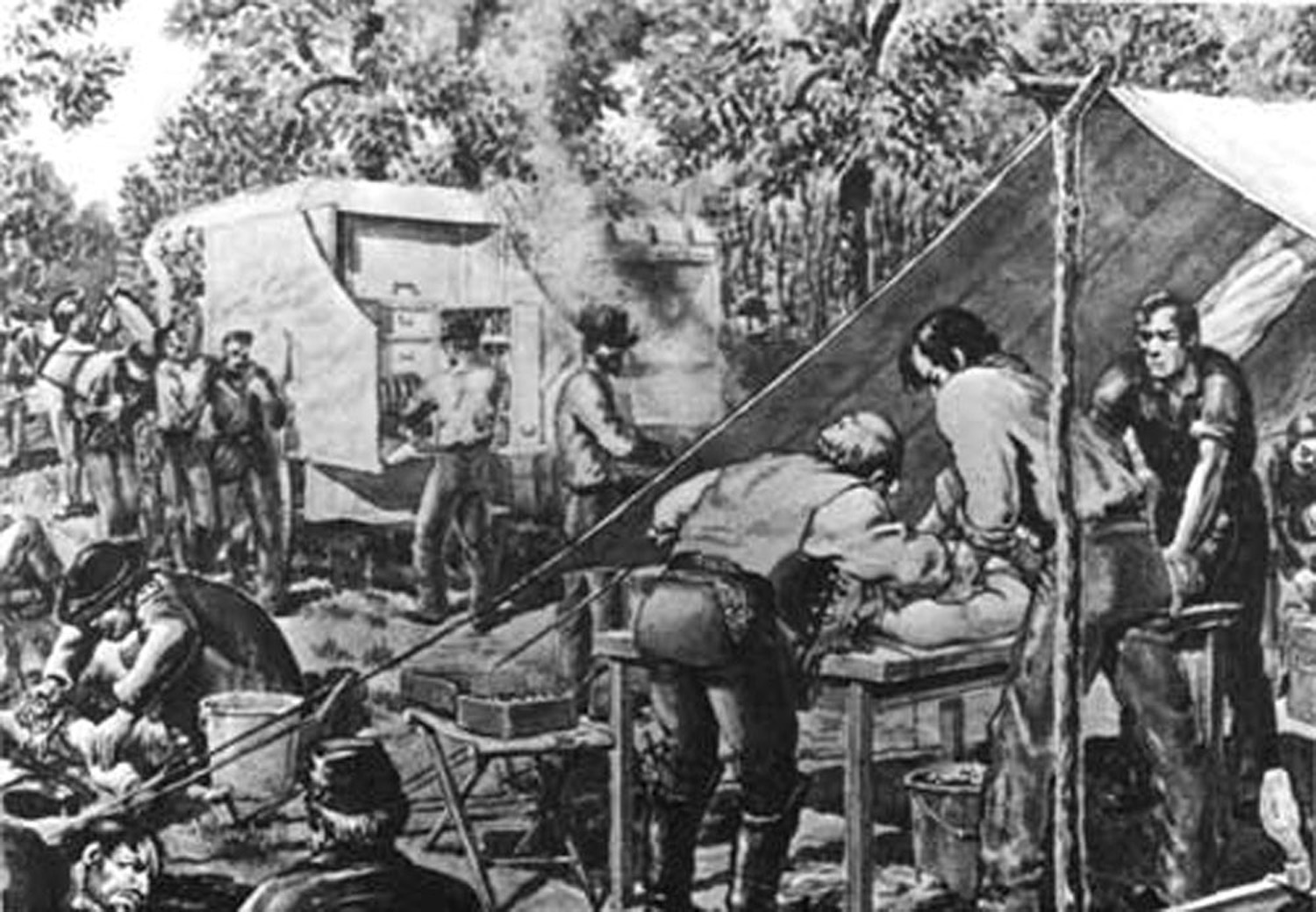The Battle of Gettysburg, fought from July 1 to July 3, 1863,
The order came to “break camp,” and the troops relocated about two miles down the road to another.
The camp was moved for the benefit of their health more than for anything else. This short march seemed to David about ten miles long. He was very near the end of his strength when they went into the new camp. Here David and Chunky put up a comfortable tent. They arranged it so that they could roll up the sides during the day, which made it nice and cool.
life in a tent is either too hot or too cold
But they did not enjoy their tent very long. The men had a good deal of excitement, being called out almost every night. It was either a tramp to the picket line or forming the line of battle before daylight.
Then the orders came, “everyone carry four days’ rations and one hundred rounds of ammunition in the cartridge-box and your haversack.”
David said to himself, “we always have ammunition in abundance even if the rations were a little short at times.”
The orders made all the men a little uneasy. During the short time they spent in camp, they could hear heavy cannonading every evening in the direction of Gettysburg. They all knew there was going to be trouble somewhere before long.
Under these circumstances, many of the men might have been thinking about the next world. But David had not yet gotten through with this one. Due to the short rations, right now, his mind got to running on a plan on how to clean out the Sutler’s tent before leaving the camp. A Sutler or victualer was a civilian merchant who sells provisions to an army in the field or in camp. Sutlers sold wares from the back of a wagon or a temporary tent, traveling with a command or to remote military outposts.
the Sutler’s tent
The men had a plan. It was after dark; this mission took place. But to their surprise, the old fellow was on guard all night and kept his lamps burning. David thought that he had gotten wind of their intentions. This being the last night that they remained in the camp, the Sutler was not cleaned out of stock as he should have been. But David thought, “I think I am square with him, for I still owe him a bill of five dollars.”
Still fighting hunger, the men returned to their camp, and David and Chunky settled in for the night. Everyone had a little trouble sleeping that night, thinking about what would come the next day. This night David had the second watch on picket duty. But before falling asleep, the haversack was opened, and the scarf-wraped bundle was taken out. David lite a small white candle he got from the Sutler’s tent and started to write.
1st of July 1863
It is the night before the battle and 1 shake at the thought of picket duty. But all is fair in love or war. Little 1 dreamed of the terrible slaughter that would take place on the morrow; and little did we think of the many that would be called to death before we should see another night.
Gettysburg first day of the battle July 1, 1863
I was ordered out with part of my company, and some of company f men on the picket line. Orders were to fire on any one, or force appearing in front, and not to demand the giving of the countersign. It was a murky, misty night, and not liking the looks of what I thought was suspicious in front of my line, I told the boys I would scout out in front to see if there were any johnnies there, and that on my return I would be whistling “yankee doodle” softly so they would know who it was.
But when half way back, the firing commenced on the left of the line, and hearing the rush coming through the cornfield, and thinking it was cavalry, and knowing my men would also commence firing to prevent a break through, I admit, candidly, that I forgot all about my whistling “yankee doodle,” and got back into line far quicker than when I went out. The laugh was on us when day light came, as the numerous dead in our front was seen to be not rebels, but innocent sheep, which would not even bite a union soldier.
on picket duty
Rations had been issued during the night at the regimental headquarters. Having hurried forward to join the regiment, those men who had been on picket, went through that battle with what little they could beg from others. Let it be stated here, that with but one single exception, there was no complaint made about it whatsoever. And that man was quickly silenced.
camp commissary
Jackson Stein was a Company cook, and he was promoted to Brigade cook. He was dubbed “Stonewall Jackson,” because the men said, “you could build a stone wall out of his sourdough biscuits.”
He got the mules through the mud by using strong arguments and throwing his left-over biscuits at them. The medical donkey was wounded, and he destroyed it. The men had meat to eat, and no one mentioned where it came from. From then on, the medical supplies had to be carried by the men now to keep them from falling into the enemy’s hands. During a rest stop, David continued writing.
feeding the troops
No date:
Reveille was not heard early. . . .after breakfast which i think was between six and seven o’clock, quite a little after we heard ‘officers call’—the officers came back and ordered us to clean up our guns as we might expect a skirmish before night. We all laughed at the idea of finding rebels in Maryland and Pennsylvania. 1 think there was not one of us who believe that there was a rebel on northern soil, at least 1 do not, nor do 1 care. We cleaned up our guns; that is swabbed them out, and saw that they were dry on the inside, and in good trim for active service. We had rain the night before, and it was a cloudy, close morning. The next order we got was to pack up; just after that we all fell into line, when our captain came along the line and was shaking every one by the hand and giving us good-bye. Poor fellow I think he was better informed than we were, for the tears were rolling down over his cheeks…
General Lee invades Maryland – Confederates crossing the Potomac
The next thing the soldiers heard was cannonading, but it sounded to them as if it were twenty-five miles away. One among them shouted, “boys, there’s ain’t no use us marching so fast, for we will be dead long before we can get there.” But the cannonading was getting plainer, and David could hear the reports better.
Confederate artillery
The trot was very nearly a double-quick for eight miles until they arrived just outside of Gettysburg. But something was missing. Bates and the Eleventh Corps were supposed to already be there, but they were tardy. Many of the soldiers that fought that day remarked later that if Bates had been in the ranks with them, the outcome would have been better. The troops had hard marching before in this campaign, but this was the worst. The roads were muddy, and when they got in the town of Gettysburg, the mud must have been four inches deep.
the mud march
The fight had already commenced west of the town when the 153rd entered Gettysburg from the Emmitsburg Pike. Along this pike, they met a thousand or more citizens fleeing from their homes as from ‘the wrath to come.’ As the troops entered Gettysburg, David noticed the town was deserted except for a few well dress ladies. David made an entry in his diary later about their kindness.
citizens fleeing
July 1, 1883:
I will not forget the ladies of the town. They stood along the sidewalks with buckets of water, and doing all they could for the men. God bless them. Chunky and our band played as we entered the town. He tipped his hat to me as they performed. Cannon were booming, and musketry rattling, while wounded were being brought back through the town. By all appearances the hell was on.
ladies of the town
The men in small groups advanced up the street from the Pike toward the town square. Standing near the middle of the street, amid all the bursting of shells, was a young girl. She was handing out water in a tin dipper. She was taking it from a tub in which her father, a man of about fifty, kept filling with buckets carried from his house nearby. These were the last two civilian’s insight.
It is not difficult to imagine what an attraction this spot was for the soldiers, especially for the younger ones. The young bucks were as eager for the sight of a pretty girl, as for the refreshing water, she dipped with almost provoking impartiality. She wore a white dress and an apron with a bib representing the stars and stripes. This was a style much worn by patriotic ladies at the time. Then David, in his due turn, got a drink from the dipper lifted by those brave young hands.
He said to the girl, “This is no place for you.”
The young lady smiled and tried to be heard above the shelling as she answered him, “Oh, it’s all right, I think,” was her reply.
After the war in his magnificent speech at Nazareth in May 1909, General Howard related an incident of a girl who waved a flag to the soldiers and gave out freshwater in the streets of Gettysburg where the bullets and shells were flying thick. He must have referred to the same girl.
There can, at any rate, be no more fitting tribute to this girl’s memory than the words of General Howard, “She was very brave, and she gave us great cheer.”
‘she was very brave, and she gave us great cheer.’
As soon as they got clear of the town, they received another reception. But this was in the shape of solid shot, shells, and everything that could be shot out of a cannon. The officers tried to calm the men while shouting the command, “forward double-quick men” as they led them toward the big red barn of the Almshouse.
the big red barn of the Almshouse
The Almshouse was a house built originally by a charitable person or organization for poor people to live in. Money or services were donated by the community to support the poor and indigent. At a later date, David made a note about it.
No date:
The shells were coming pretty thick as we made our way towards a big red barn. Some were going over us, and some did not quite reach us. A shell exploded right over the column, and every man dodged for the instant. We had a little fellow in the company who threw himself on the grass, and while I was looking at him and laughing, and not paying attention to my feet, the foot on the game leg struck a big stone and I fell stretching about a rod before I got down. The ranks opened and allowed me all the room I needed, and I have no doubt they thought I was the first man killed. When I got on my feet again i was alongside of captain Howell of company d, and as our guns were not loaded, I proceeded to load mine, when the captain gave the command to load and it passed along the column.
Confederate artillery
All the soldiers got to the barn without the loss of a man. There they formed the battalion in mass, and the Major addressed the regiment. “Men we were a nine-months’ regiment, and our time has expired on the 22d of June”.
The Major told the men their time was up, and if there was a man in the ranks who did not wish to go into battle, he should step out. Then he went on to say, “it is no disgrace but that the enemy is in our native state and that the people of Pennsylvania look to us for relief. And that it is our duty to protect our homes”.
But before his speech was ended, an order came for two companies for the skirmish line. Companies A and B were detailed, then the Major concluded his address. The men gave three cheers, and not a man stepped out of the ranks. The bugle sounded the advance, and David followed the skirmish line, by battalion in mass.
battle in the wheat field
All but eight companies of the regiment were forming the skirmish line. To the left of them was a wheat field which was full of Rebel sharpshooters, and the woods in front was likewise full of them.
Rebel sharpshooters
While they were advancing, General von Gilsa took his position in the rear of the skirmish line about fifty yards in advance of David. He could hear him giving orders to the skirmishers.
The General shouted, “do not shoot unless you see something to shoot at. Ammunition is money, so do not waste it”.
the skirmish line
Just at this time, the bullets commenced to whistle, and some of the boys on the skirmish line were trying to dodge them. The general told the boys, “never mind those that whistle, as long as they not whistling Dixie, you are all right.”
Confederate soldiers killed near the wheat-field at Gettysburg
The skirmishers cleaned the rebels out of the wheat field in short order. David and his men followed up the skirmishers to clear out the woods, and there they deployed right and left in the line of battle. They advanced about five rods into the woods where they got into position. Then more side-steps to the right to stretch the men out and cover more ground till the line was not any more than a single one. The woods were so thick and the men so far apart, it was hard to see the next man on either side.
Off to his left, David heard the familiar snap of dry brush breaking. He could tell by the sound it was not a small animal approaching, but it was the footsteps of a man. The light through the threes cast little shadows moving around as if everything was alive. It was tough to tell the real from the imagination.
“There!” David listen hard and thought he heard it again, then he did.
He had learned while deer hunting if you hear something moving in the woods, stand still and don’t move. There was a little chill in the air, and David could see his breath and wondered if anybody else could. He slowly turned his eyes, then his head towards the sound. Something was moving through the woods, and it was a Confederate soldier. He must have just noticed David because he turned and fired directly at him.
a shot in the woods
David immediately returned fire, and he saw the Rebel drop his gun and fall backward to the ground. Both soldiers understood that this was a war to the death. And there was no room in this war for either hesitation or pity before pulling the trigger. The shots echoed throughout the woods, and just as quick, it became deathly quiet again.
David had shot at the enemy many times before, but this was different. He had seen men die before, even his close friends, but this was different. He had witnessed the awful effect of artillery raining down death on many soldiers all at one time, but this was different. His heart was racing, and he broke out into a cold sweat. His mouth was so dry he could barely swallow or speak. His whole body felt like lead, and he could not move. What had he done? He was trained to fight and kill the enemy. The Rebels were killing his comrades all around him. David knew he never felt this way before, and he also knew he never wanted to feel this way ever again.
The force of a mini ball or piece of shell striking any substantial portion of a person is astonishing. It comes like a blow from a sledgehammer, and the recipient finds himself sprawling on the ground before he is conscious of being hit. Then he feels about for the wound, the benumbing blow deadening sensation for a few moments. Unless struck in the head or about the heart, men mortally wounded live some time, often in great pain, and toss about upon the ground.
Now David found himself slowly walking towards his kill. He was no longer concerned about being quiet or careful as he advanced directly to the very spot where the man lay. One shot was all it took, and the man was dead. But David was not proud of his marksmanship or with his kill shot. He remembered when you are deer hunting, it was always best to have a good kill shot to the heart to bring the animal down immediately, so they do not suffer. But he could see from the expression still on the man’s face that he did suffer greatly. The young soldier’s last efforts had been to tear apart his clothing to see how bad he was wounded.
David threw down his gun and got sick. He felt too hot and almost passed out right there on top of the dead soldier. It took several minutes and a few deep breaths before he got his battle wits back together. Then he realized that he was not in a safe place, and he had to get out of there right now after firing his weapon. Anyone around, friend or foe, would know right where he was, and they would be looking for him.
David looked back down at the soldier lying lifeless in front of him. He somewhat expected the dead man to rise up and keep on playing war like they did when he was young. But this game was real, hard to take, and impossible to win. Seeing what he could use from the dead man, he took it. Canteen, ammo, and he felt something like a book in the rebels vest pocked. Books were not always just for reading during the war. They had another critical use other than that. Toilet paper. All the soldiers on both sides searched the bodies of the dead and took anything usable. David had done this too many times before.
the kill
This time he felt a little numb as he went through the motions, and then he found it. From the vest pocket of the dead Confederate soldier, he removed a small silver case. As he was looking at it, it popped open, revealing that it held a tintype picture. It was a small tintype like the ones that you could get from a vendor at a fair or on the street in town. David took a close look at the picture. It was of a group of young children. He reached into his shirt pocket and felt his tintype picture, but he did not need to pull it out and look at it. It was the same one. Then he knew, the man lying at his feet, was his cousin. Now he saw the scar on the right side of his face left there from the broken stick. He could see that the young boy, Chunky, and he used to play war with had put on real soldier’s clothes and become a man. Now he was a dead man. And David had killed him. When they were children playing war, he would just get up from playing dead. But not this time.
A familiar tintype
Two incoming rounds from, two different directions, hit the ground and the tree next to his cousin. The truth is, when bullets are whacking against tree trunks, the consuming passion in the breast of the average man is to get out of the way. David’s reaction was automatic, and he retreated from that ground immediately! He ran. And he ran.
As the low brush swatted him in the face, he kept running until one of his own men shouted, “if you are in a big hurry to get to the front, it’s in the opposite direction.”
Then David stopped, set down, still holding his weapon he leaned upon it and cried. Then he abruptly got up and returned to his place in the woods on the line.
Rock creek
The skirmish line, when formed, ran through a small piece of timber with the ground sloping down toward Rock Creek. The underbrush was also dense. The line of battle had been formed on the brow of a hill some three or four hundred feet behind David. The fact was soon ascertained that they were being fired on front and right flank. Accidentally, they had got into an angle of General John B. Gordon’s Corps and were receiving friendly fire. The shooting stopped when both sides began to sing the Battle Hymn of the Republic.
Union soldiers laying down under fire
The men were all tired or more dead than alive, and it did not take long for them to lie down.
As soon as they got down a battery in the rear on higher ground than they were opened fire. The troops could feel the heat of the balls as they passed over. About this time, the Rebels made a charge away to the left of where the men were lying. The battery in the rear turned their guns on the advancing Rebel army. David turned his head away because he could not stand to watch the carnage of the cannon fire on those unfortunate men.
Confederate soldiers under heavy fire
David could see balls ploughing up the ground along the rear of the line. And he thought to himself, “if ever Johnnies ran for cover those fellows did.”
Shortly after this, the Rebels made another charge near the center of the line but still to the left of David’s position. He told his nearest comrade, “I think it was a feint, their object being to keep us in our position until they got ready.”
As soon as they fell back, one of the boys near David said, “we will get a chance next.”
When the men enlisted, they all got a copy of the Army Field Manual. It says in the book that “a rod is about 5 ½ yards”. Running along their front was a little stream about three rods out. It had a thicket of large trees on the opposite side. David could not see over seven or eight rods in front of him. Back behind these trees was a relatively flat piece of ground a lovely meadow. It made an excellent place to form troops, but he did not see any there.
Gettysburg second day of battle July 2, 1863
It was only a few minutes after the repulse of the charge on the left and not over ten minutes after their line was formed, the skirmishers commenced to rush back in. They were followed by three lines of battle. The man on the right of David brought up his gun and aimed at one of his own men. David saw what he was about to do. And quickly struck his gun, raising it in the air so that though the gun discharged, the man was saved. The skirmisher was not more than one rod from them when this happened. And it did not take the rest of the skirmishers long to get through their line. When David could, he recorded his memories.
death all around
No date:
I fired my gun and as I was taking a cartridge a man behind me was shot. He fell half his length ahead of me, his face towards me. Here was the only time in my life when I tried to look cross-eyed. I was trying to get a cartridge into the muzzle of my gun on my left and watch that fellow dying on my right…. And just at this moment the man on my left was killed …. The thought occurred that i might be the next; and there was no use being excited about it. . . .there was no running, but good, solid fighting. We had fired four or five rounds when I heard the order to fall back.
Carrying a regiment’s colours into battle was considered an honour and a privilege. It was also a dangerous job and would likely get a man maimed or killed. Thus, it required a great deal of courage. Just at this time, David was very much interested in the Rebel color-bearer. The enemy was only two or three rods from him. The company’s line was broken on the left, and their right was attacked in the flank. There was nothing left to do but retire or surrender. This moment was remembered in his diary.
Rebel flag bearer
No date:
We were ordered to fall back, but I did not obey this order with the rest of the regiment, for I was very much interested in the color-bearer. .. .he was coming through the creek in front of us. The creek was about twenty feet wide, and about three feet deep…. He was yelling like an Indian. At the time I was returning ramrod… I thought for the moment I will fix him as soon as I can get a cap on my gun, but while I was placing the cap I changed my mind as the thought occurred he could do very little harm with that rebel rag, that I had better shoot a man with a gun.
Rebels behind a split rail fence
There was a low fence between them about four or five rails high. Another Johnnie Reb was a little in advance of the wild color-bearer with his gun held in his arms. He was just about to reach for the top rail with his left hand, which was about hip-high. When David fired, the young Confederate soldier struck his hand against his side and dropped. He did not come over the fence. Up to this time, David had been down on his right knee with his left one cocked, which gave him a perfect rest for his elbow during firing. After he had stopped the Reb on the other side of the fence, he arose and drew a cartridge. While he was tearing it, he looked to the rear and saw his men had all fallen back about two rods, firing as they retired.
the dead on the field
This gave David a good view of those that were left dead on the first line of battle. It presented a regular swath of blue coats, as far as he could see along the line. They were piled up in every shape, some on their backs, some on their faces, and others turned and twisted in every imaginable shape. There was a dead man on each side of him. David stood between those two lines of battle, viewing the windrow of human dead composed of his old comrades. It presented a picture which would never fade from his memory. It was a picture which the tongue cannot tell, nor pen can describe, but he did his best later in his writing.
where they stood
No date:
The bullets were whistling about like hail. I seemed to wear a charmed life, and the bullet was not yet made that could hit me. But I was soon undeceived. I had not gotten back much over two rods when I felt something strike my left knee, as we were in the woods I thought a bullet had struck a chip, and that the chip had hit me on the knee. When I looked at my knee I saw a bullet hole in my pants. I had not gone over five steps when I felt a similar sensation in my other knee. This one had cut a little deeper, which I discovered by pulling up my leg. I was between two brush piles as we were passing out of the woods.
the wounded all around
After David was hit the second time, he went over the brush pile and toward the enemy into an open field. It was a sweltering place as he was under two crossfires and a good far from the rear. Both balls that hit him were from the crossfire. There was a battery about three or four hundred yards in the rear on what they later called Barlow’s Knoll. It was at this place they were ordered to fall back. David expected they would fall back, and there make a stand. But as soon as he got out of the woods, he saw the battery was limbered up and was retiring. David later wrote down what he saw.
No date:
I witnessed an instance of brave conduct, of which i am possibly the only witness living. In the first day’s fight on a little knoll, the overwhelming rebel forces, as all know, drove our comparatively thin line back. I lay on the ground at the extreme right of the line, with a bullet wound through my knee joint, I remember watching, with mingled apprehension and pride, the stubborn retreat of our regiment. After the main body of soldiers had gone back about a hundred yards I saw Captain Howard Reeder of company g standing not ten feet away. He was deliberately discharging his revolver into the ranks of the onrushing rebels. He then turned and ran. I wondered to himself, “how he ever got away without being killed was a miracle,” as the rebels could not have been more than 15 feet from him. This was certainly the deed of the type of leader that orders his men not, “go forward here and there” but “come along with me boys.”
Barlow’s Knoll
The troops were driven back for two miles. After David and a few men got into the open field and took that way out. Their right was now their left in retiring. David saw a long line of the enemy closing in on the right, or what had been the right, advancing. This line of battle, over a mile long, was closing in on him like a gate. By the time the troops had gotten on Barlow’s Knoll, he had worked himself along in a straight line with the red barn at the Almshouse. To his right, the troops were dropping like flies, and to his left was that solid line advancing and firing.
the barn at the Almshouse
No date:
I recollect many things about the boys. At Gettysburg during the first days fighting comrade Philip Halpin was killed between the Almshouse and Barlow’s knoll. I knew sergeant Edward Kiefer. He always looked out for us in dealing out the bread.
David was, at all times, less than one hundred yards from the Rebel line. He passed along their front for nearly a mile till he got to the red barn. Long before he got to the barn, he could hear the voice of General von Gilsa, who was dismounted. A bay horse came along the line with saddle and bridle on.
The general called to the men, “catch my horse,” which was soon surrounded, and the general was in his saddle in less than a minute.
By the twitches of the horse’s tail, the old man must have been tickling the horse with his spurs. It did not take him long to form a line of battle about halfway between their first position and the town.
He rode up and down that line through a regular storm of lead, meantime using the German epithets so familiar to him. David could hear the words “rally boys.”
“rally boys”
No date:
I saw big joe buck, the best fiddler in the company get killed near Barlow’s knoll in the extreme front position our regiment had taken at Gettysburg. I saw where 18 bodies were buried in one grave at that spot. These bodies along with all that could be located elsewhere over the field were taken and buried. All the bodies that could not be identified were placed in tiers of the plot with a special marker. I’m sure joe buck in playing a gig in the grave of the, “unknown.”
burial of the dead
The line was ordered to fall back. David followed orders, but this still left him and the men between two fires. He finally got to the red barn where the highest post fence he had ever seen confronted them. Joining the other men, he threw his gun over then commenced to climb it. But it was quite a job to get over that fence with his wounds and a lame leg.
How David would have liked to have entered that barn for a rest, but he knew he must move on or be taken prisoner. When David got around the barn, he met Captain Howell and Lieutenant Walton of Company H, both members of his regiment. Howell took him by the left arm and Walton by the right, which was a significant improvement. He felt very much pleased with the escort, but it did not last long.
Suddenly the captain stumbled and stated that he had been wounded. Just a second later, the lieutenant fell from a wound and came near, dragging David with him. Walton was a large man, weighing about two hundred and forty pounds. Barnes and Beidelman tried to lift Walton into a window and being very heavy, they could not lift him. They pressed two big privates into the service, and they kept on as the enemy was only about fifty yards behind us. After this, he met Freddy, who had a piece of a shell struck in his kneecap, and he was quite lame.
path of the 153rd as they retreated through town towards Cemetery Hill
About this time, Sergeant Keifer of David’s Company reported the woods in front of them were being massed with men behind the thickets making ready for a charge. He told him it was useless as the force was a heavy one.
David then happened to look up and asked him, “Where is our battle line?”
He looked around and remarked: “It’s gone. Get yourselves out the best you can; report at Cemetery Hill,” then all the men quickly got out of that dangerous spot.
retreat
Some men in the skirmish line fired then fell back the usual distance, loading as they went. Then they halted and fired again. And at the command, they retreated on the double-quick only to get ‘back-shot’ by the rushing Confederate soldiers.
Gen. von Cilsa was standing a short distance up the slope, commanding, “Cease firing; they are our friends.”
David ran up to him and said: “No, General, they are the enemy, and they are charging in two lines.”
hand to hand
When David got to the spot where his company had rallied, the fight was on in all its fierceness. Muskets were being handled as clubs. Men tore down rocks from the wall in front and threw them down, smashing into the bodies of the advancing troops. At times the fighting was so close only fists and bayonets could be used. Each man could feel the breath of the other man trying to kill him. This battle was so traumatic to David that it was a while before he could write about it in his diary.
fighting for the colors
No date:
I remember distinctly of seeing a rebel color bearer, with his musket in one hand and flag in the other, with outspread arms jump upon the stone wall, shouting “surrender, you damned yankees.” in an instant a company a or f man, I could not tell which, as the smoke was commencing to get heavy, —ran his bayonet through the man’s chest and firing at the same time. I can still see in my mind’s eye how the shot tore into shreds the back of his blouse; as he fell backwards holding to his musket and colors, part of the flag staff was on our side; someone grabbed it while some one on the other side got hold of it and the tussle was lively for a few seconds, who should get possession of it. I think the Rebs must have gotten it, as I never saw or heard of it afterwards.
The 153rd Pennsylvania Volunteers on Cemetery Hill
As David was retreating, he noticed Lieut. Yeager, who had gone down with a terrible wound having been shot through the hip. He was urging his men to withdraw, or they would be taken prisoners. A moment afterward, a rebel shell passed in front of David, and the swing of its fuse struck him across the face leaving a black powder burn. Meantime David thought of home and friends, but he remained ready to shoot every Rebel insight.
Confederate charge up Cemetery Hill
All the straggling soldiers finally landed on Cemetery Hill behind the stone fence. One of the men shouted, “let them come now, shoes or no shoes, we will let them know that we are here.”
After being behind these fortifications for a while, David saw the Rebel skirmish line drawing out on their right. Orders came soon for them to go down and meet them which they did, in the fields down below Cemetery Hill
Confederate soldiers stripping fallen Union troops of clothing
On the slope of Cemetery Hill, David saw many dead soldiers whose pockets had been turned the wrong side out. They had obviously been searched, and their valuables had been taken. Most horrifying were the bodies that the clothing had all been torn open. He could tell when he saw blouses unbuttoned and even trousers pulled down, this was done by the dying man himself looking for his mortal wound. His body was left as a testimony of his last minutes, and David could tell how he died by the expression still life like on his face. This was a common sight after a battle.
The next day while on the skirmish line, Lieut. Barnes and David were standing under a small tree and discussing how soon the Louisiana Tigers would charge them. They had been discovered shortly before sunrise, lying in a depression in the ground at the front. About this time, something came sailing along through the air just between the two men that had not the familiar sound of a shell.
The Lieut. remarked, “I think that must be a piece of iron” As it passed through the treetops, it broke off a limb about an inch thick.
When the branch dropped to the ground, it knocked Barnes’ cap off. “I think it was iron, boy,” he remarked, “and the next thing they will be throwing blacksmith shops.”
As expected after sundown, along came the Tigers with many others charging in two lines deep. Sometime later, David wrote about it in his diary.
the Louisiana Tigers
No date:
In the evening of the first day I had charge of a detail of men before the cannon. We remained in this position protected as well as we could during all night of the first day and until The evening of the second day. Up to the time of the charge by the Louisiana tigers on the evening of the 2d, we were associated with a skirmish detail of the 33d Massachusetts. After
The charge was made and the enemy repulsed we followed them down to the stone fence and lane. Here we remained on these low grounds until the 4th day.”
the stone fence lane
David had taken the only option for a safe position at that moment, and it was behind the stone fence. He laid his rifle resting between two stones so he could fire whenever a rebel popped up out of the tall grass or from behind a tree. That was how he had to pick them off when the opportunity came. He was just in the act of firing when he was hit by a ball in the left knee. He, of course, ceased firing, and lay down and took in the situation which was very sorrowful for him.
David felt helpless and unable to move. Then he prayed, “dear Lord, help me.”
A tear came to his eye, but he brushed it away as he took out his mother’s handmade scarf from his haversack. He tied it around his leg to stop the bleeding. It was soaked with blood right away.
The overwhelming Rebel forces drove their comparatively thin line back. David lay on the ground at the extreme right of the line with a bullet wound through a knee joint. He watched with mingled apprehension and pride, the stubborn retreat of his regiment.
carrying the wounded from the field of battle
Lieutenant Barnes, commander of the Company, at that time came near where David was lying. He told him quickly the condition he was in as there was no time for a long story. Barnes sent two men to carry the wounded man from the field and away from danger, which they did willingly to get away from the fire themselves. They took David up to Cemetery Hill across the road and laid him down in some grass. Then the two comrades who were so kind to him vanished. There was no time to thank them for their kindness.
Civil War ambulances
David looked about and learned that he was lying in a graveyard, the old Gettysburg cemetery. Soon, however, an ambulance came along, and he was taken up, and the horses were driven as fast as they could go. He was lodged on the threshing floor of a barn that was used by the eleventh Corps for a hospital, and they laid him down near the big door. David had an excellent view of the bursting shells coming in his direction. It was at the time of Pickett’s charge. There were at one time six explosions of shells in one moment!
Pickett’s charge – third day of battle July 3, 1863
It was a grand sight indeed, but the danger was becoming so great that every man was removed from the barn, except David and an old German. Speaking in German, he expressed himself in words that David did not understand, but he had heard before. Then the man exited the best way he could using a mop for a crutch.
make shift hospital
The surgeon who had been in shortly before looking after the wounded men ran for his life with his coat tail standing straight out. As he passed the door, he called out to David, “get out of there as soon as you can,” the same time knowing that David could not move.
The surgeon soon sent two men to carry him away, which they did. They placed him in the lower part of the barn, in a building called a wagon shed. This place was occupied mostly by wounded Rebels. He was now out of sight, but not out of danger. These fellows were his company for two hours, they, arguing for their cause, and David for his.
It was a real blessing from God that David had been put among the Rebel soldiers at the time in the battle. The Union lines were very fluid and crumbling in some parts. Buildings and places of refuge were prime real estate to infantrymen. So, it was to no one’s surprise that the barn where the hospital had been set up was the first structure the advancing Rebel forces approached.
The first two soldiers entered the wagon shed and pointed their bayonet mounted rifles directly at David’s body. “yawl’s captive prisoner now we use you for the exchange.”
All captured men, enclouding the wounded were being immediately being sent off as prisoners of war to be used for the exchange of their soldiers held in captivity.
Rebel soldiers taking cover
Then what happened next can only be one of the many miracles that did happen during this struggle of liberty between free men to set other men free. All the wounded men in that room had shared a near-death experience. Not only their personal wounds, but they had seen and witnessed the trauma of others. They were all under the same cannon fire. And there was no way of knowing whose shells were falling all around their perimeter. They just knew that each one of them could die in a flash. This is the bond of brothers in combat. Unless one has been there, one will never experience its holy power to make all persons one. The rebel soldiers had the time to listen to David’s view on being an American. Even though there were many differences between the two opinions, each rebel soldier overcame his wounds. And they moved to stop their own men from approaching David in any way.
The only comment they made was, “this Yankee is one of us,” and none of the soldiers who entered that room challenged them, for they told everyone the same thing.
David wondered about his tentmate Chunky. Where was he? How was his afire?
There were few men in the regiment with whom David was better acquainted, especially in earlier life. Chunky was a man of exceptional presence and congenial spirit and manners. He made friends and held them. He took great pride in everything that pertained to his Company. He was deservedly popular with his men. Many of them have known him from boyhood.
David laid back, closed his eyes, and said a little prayer to the Lord. He asked him to watch over Chunky, “please Lord, keep him safe from all harm. And Lordy, if he gets himself captured like I did, I pray that he will be treated with kindness like these men who surround me now”. He did not open his eyes until the sounds of the morning could be heard.
the wounded
Lying in this same spot until the afternoon of July 2nd, David was then removed to the Poor House. No room was available there—the place was filled with Rebel wounded—he was put down in the yard, near the driveway. Shortly before noon, a Rebel signal corpsman got up upon the roof of the Poor House and started to signal the Confederate Army.
signal corpsman on the roof
Then began a terrific cannonade from the Union forces in their efforts to dislodge this fellow and stop his signalling. The shells passed over David’s head and landed in the garden nearby. He thought about the onions Chunky and he had stolen the day before. But now all that was left of someone else’s hard work was a smoking hole in the ground and the smell of gunpowder.
Union guns
Judging from the effect upon David’s wound —each crash was like singeing the leg with a hot iron. The suffering of the wounded in the Poor House, he imagined, must have been terrible. This torture had continued for some time when a bright young Confederate officer passed by.
David called his attention to what the corpsman on the Poor House was doing, adding that he thought a hospital was not the place for a signalling station. To the young officer’s credit be it said that his face flushed with shame at the action of his comrade in arms. Drawing a revolver, he pointed it at the Rebel on the roof. And with an oath, commanded him to come down or he would kill him. The fellow complied in a hurry, and the firing that had been directed upon the Poor House ceased at once.
Comrade Doll lay wounded in the left shoulder right next to where the Rebels had laid David down. He said he had been brought there in the morning and left for dead.
Mr. Doll was sad that his friend James had been removed for burial, “How sad that we were within a mile or two from where he was wounded, and I could not have been with him, to at least pour cold water on his wounds. James was a good boy,”. Not thinking of himself at all, the man died.
field hospital
David tried to make himself as comfortable as he could. He was cold and reached for his haversack but, it was gone! Where did it go? Did someone steal it? Where did I leave it? These thoughts went thru David’s mind all at once! When did he last use it? He could not remember. When did he last see it? He was not too sure. Did it get left where he was wounded? He thought that he had it with him up until now.
“Oh No,” David said aloud when he realized what was in the haversack.
His Bible with the diary inside. He felt down his leg, to the knee, and his mother’s scarf was still there. It was loosely tied, but the dried blood kept it in place. It was a badge of honor. At least he still had that. David could feel a deep hole in his stomach, and he felt a little faint.
Next: The Chunky story – part 1
>>>Click here <<<
Word count: 8081
